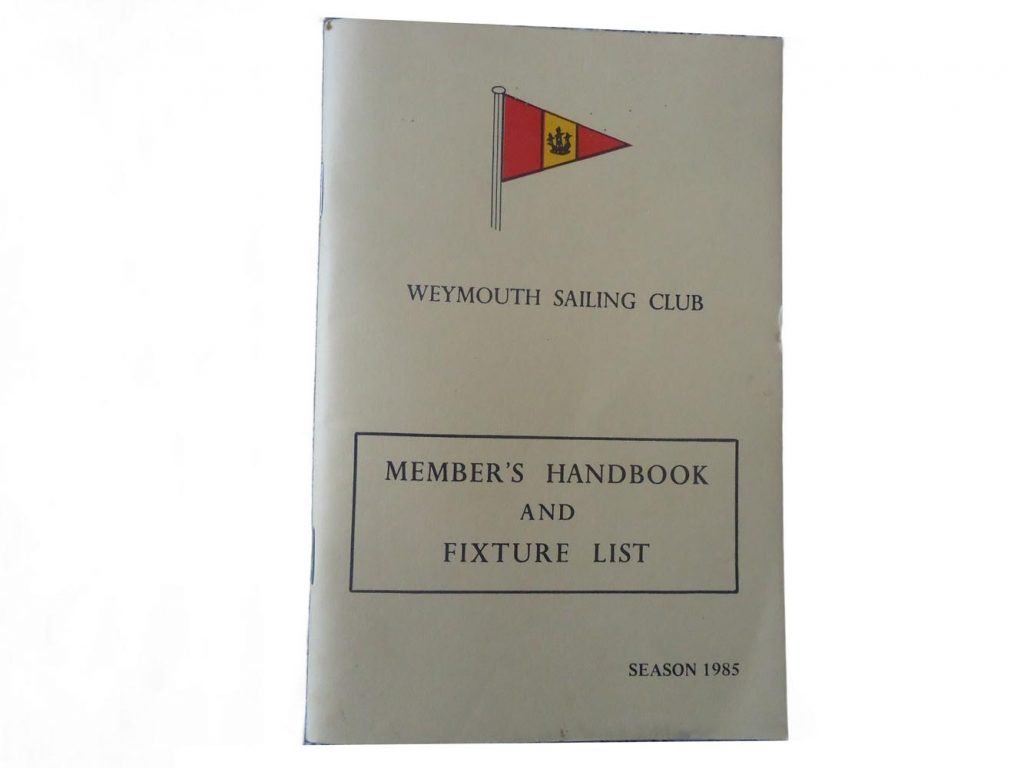
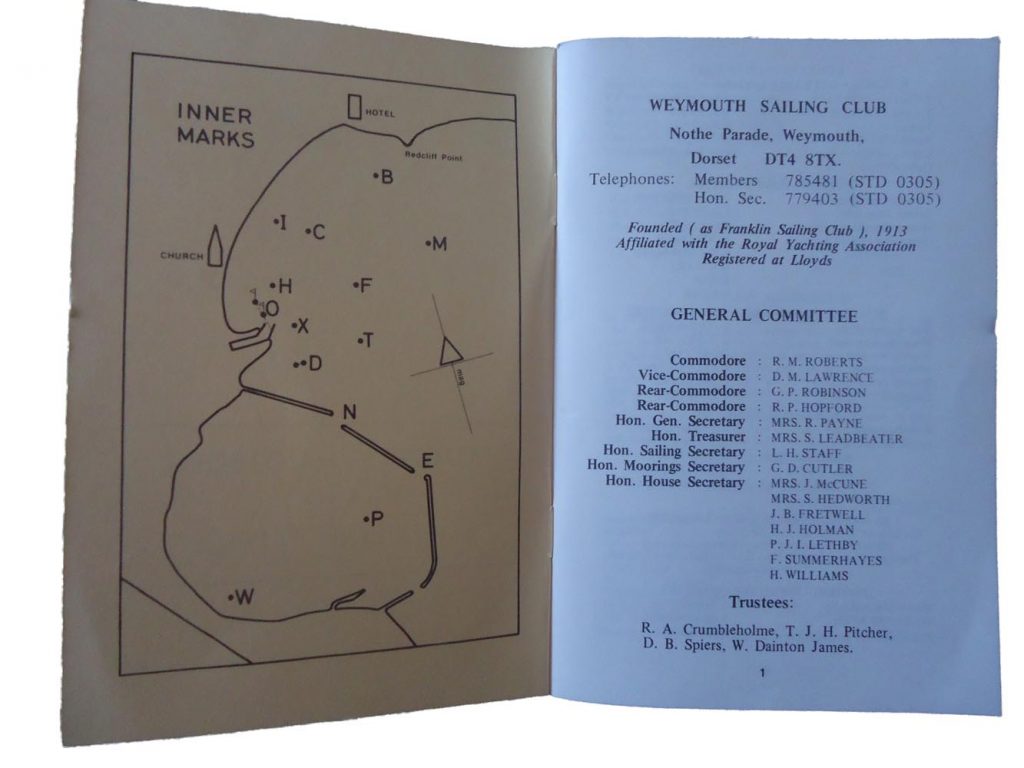
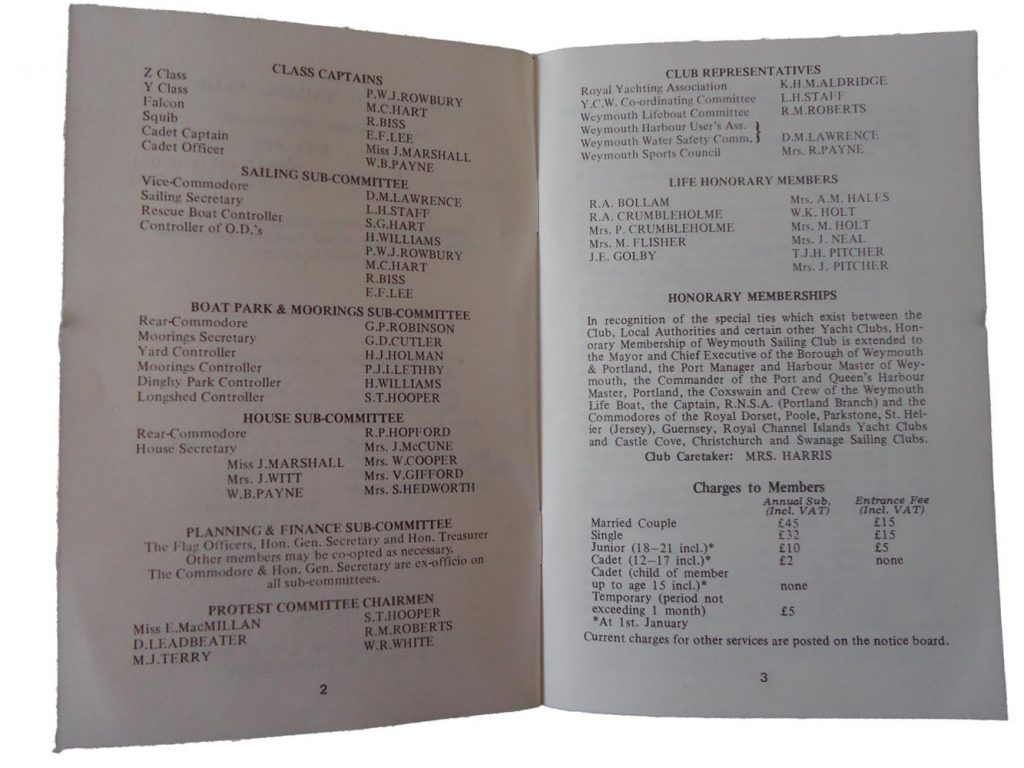
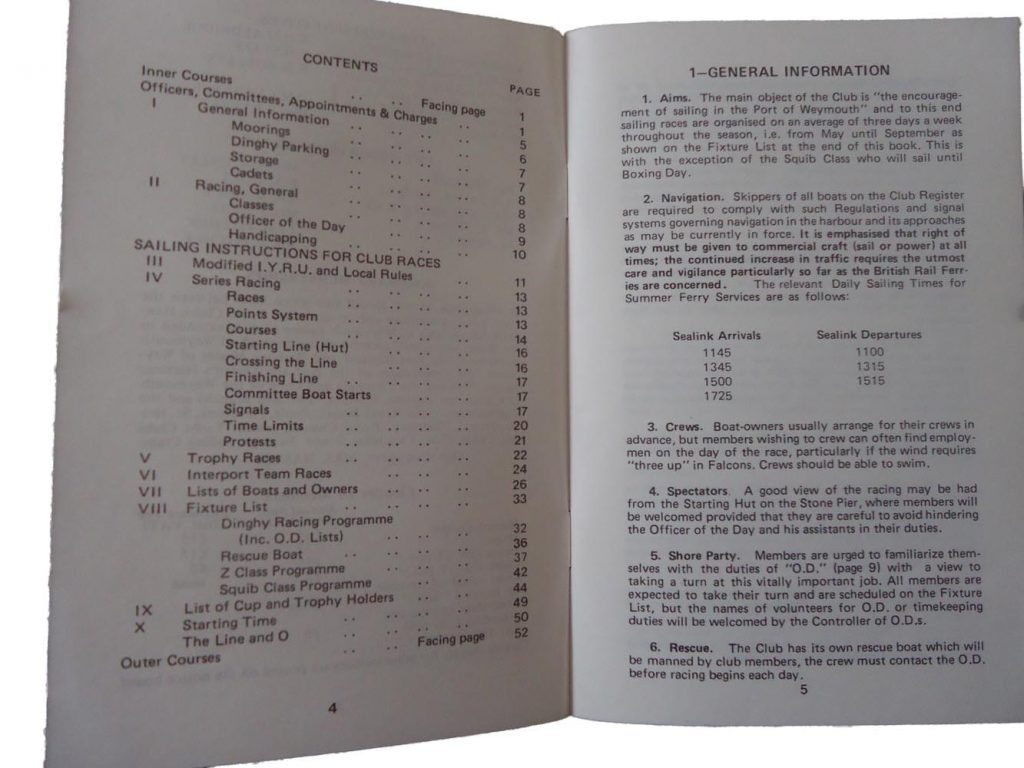
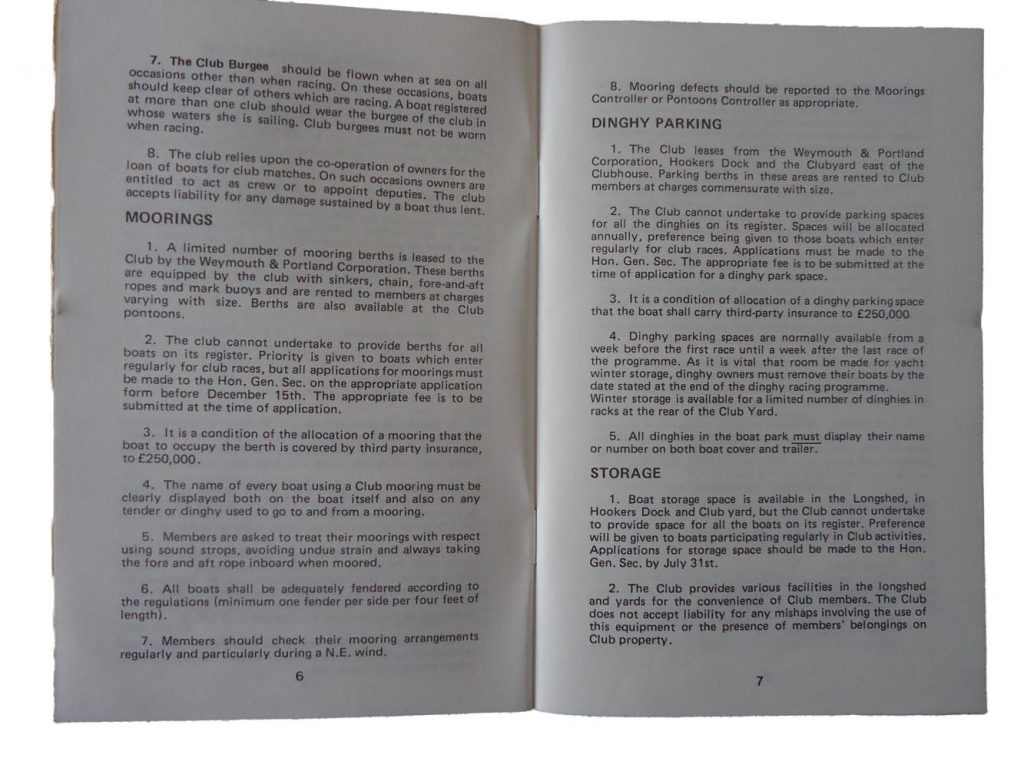
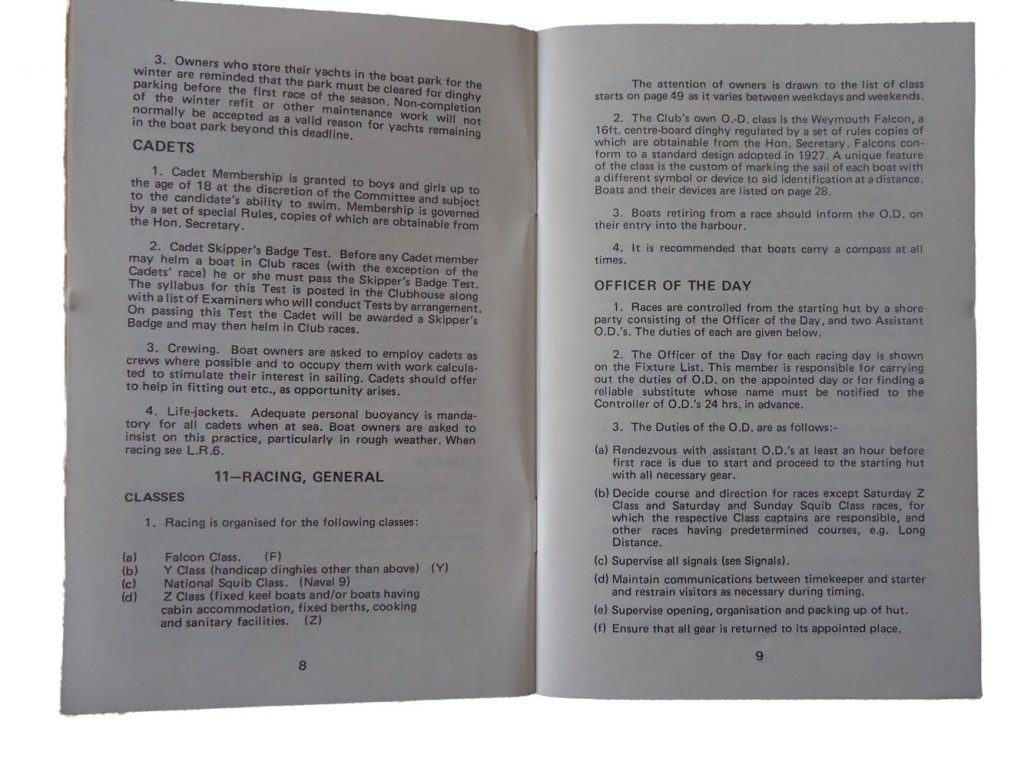
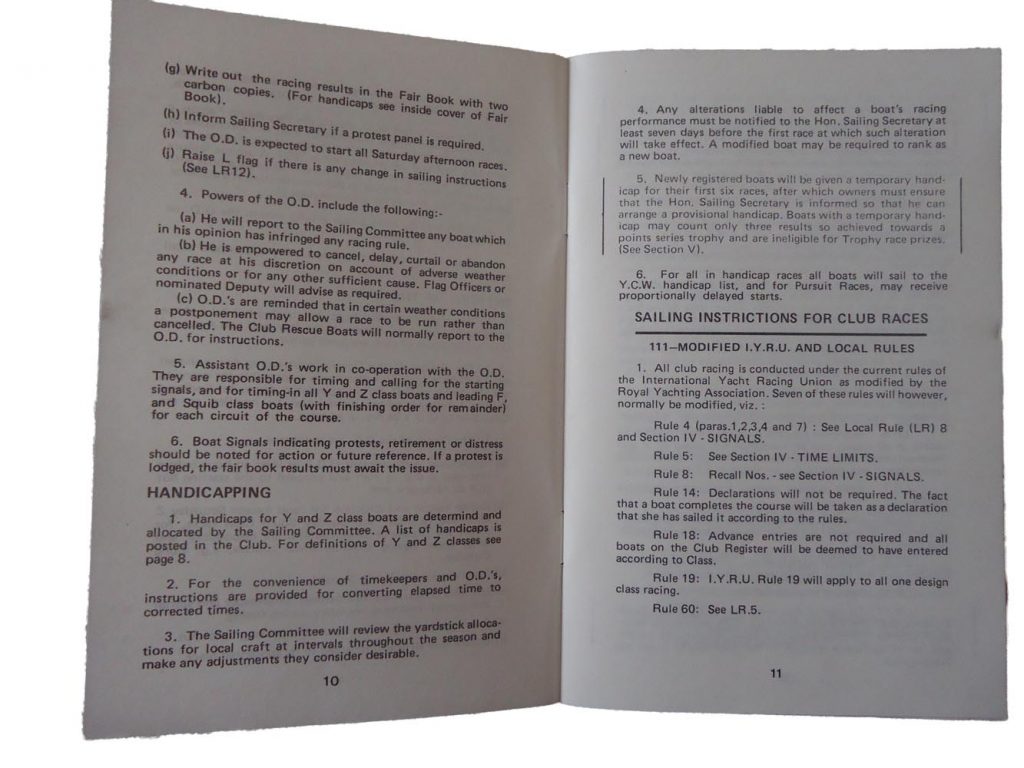
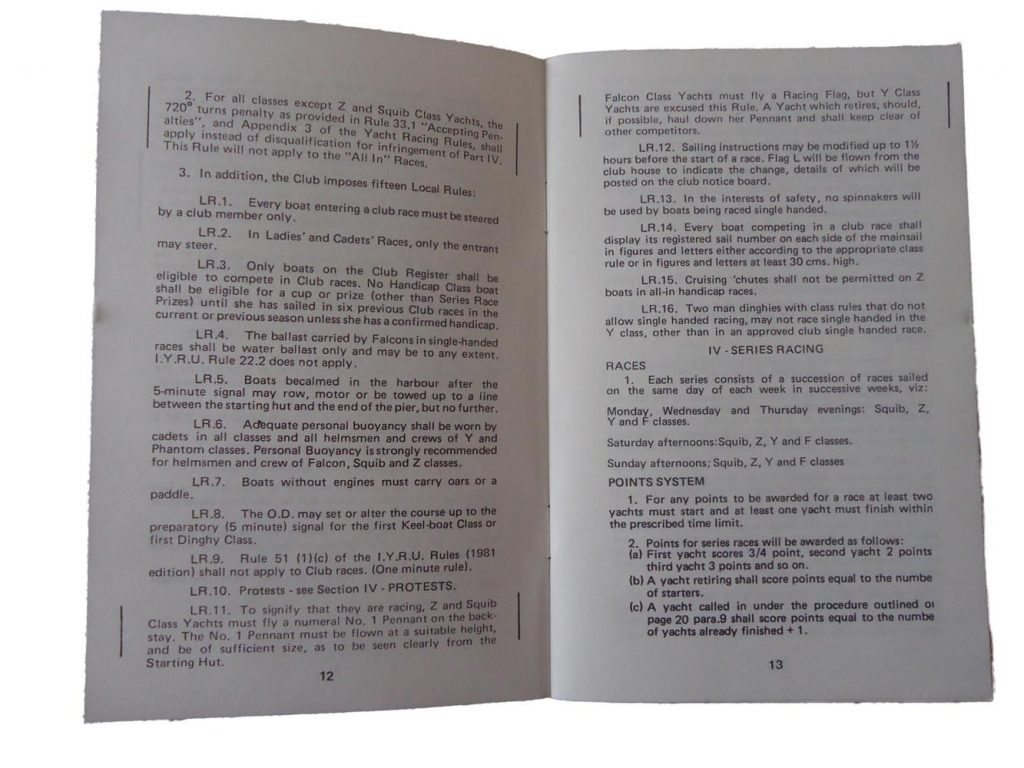
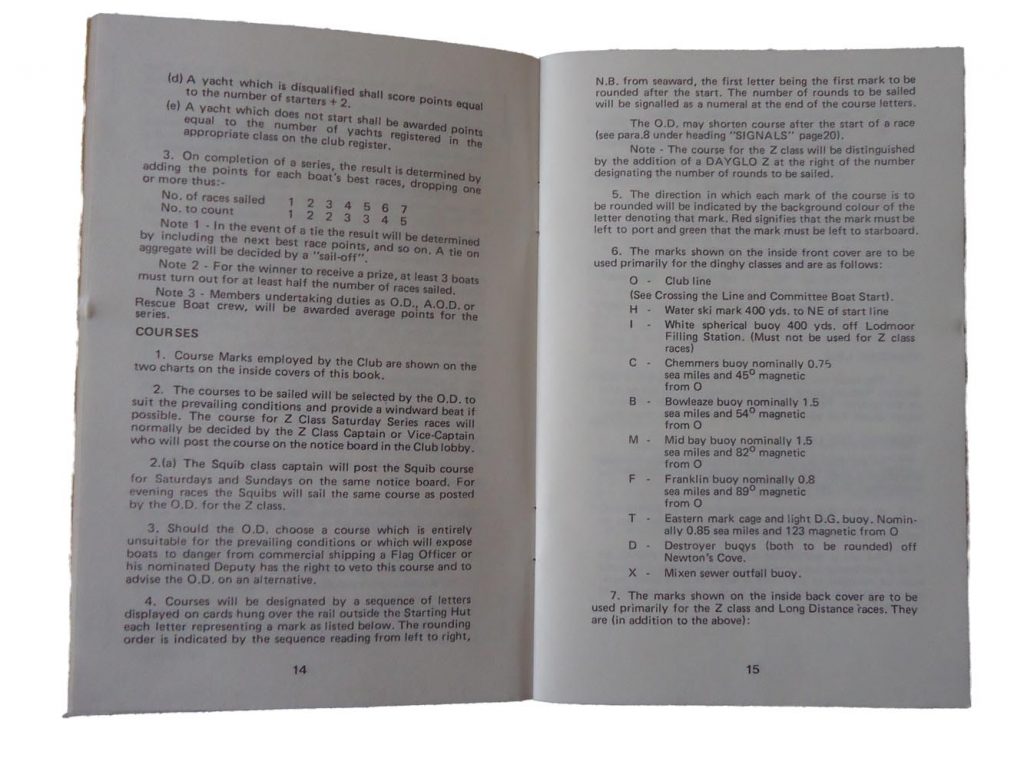
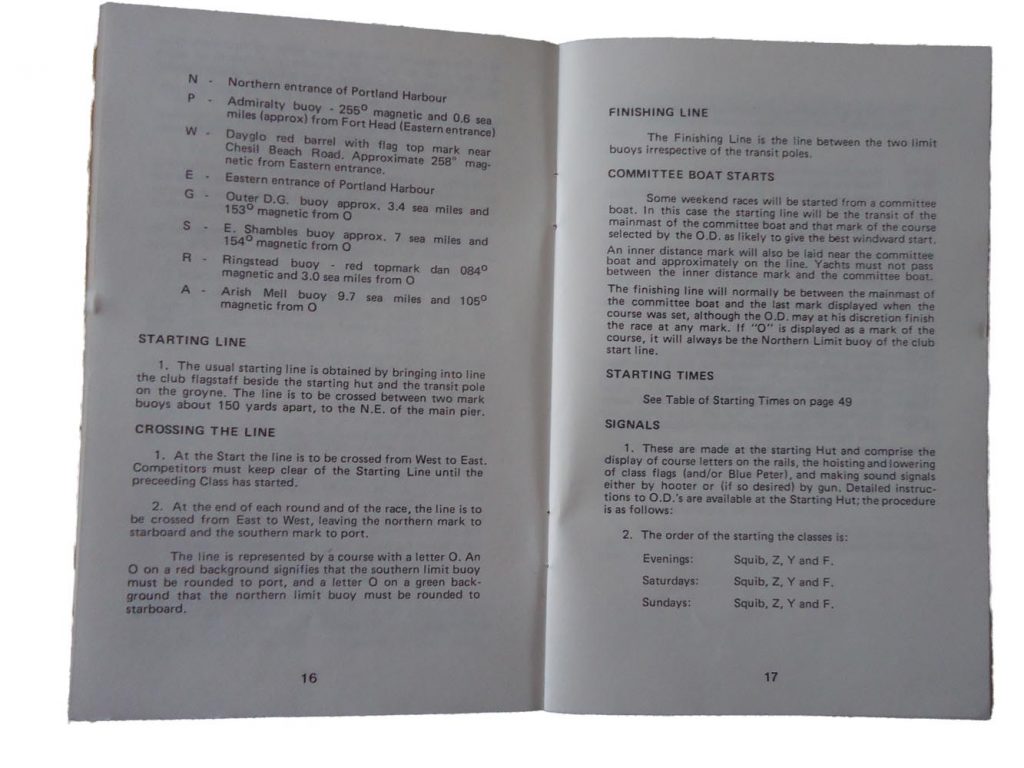
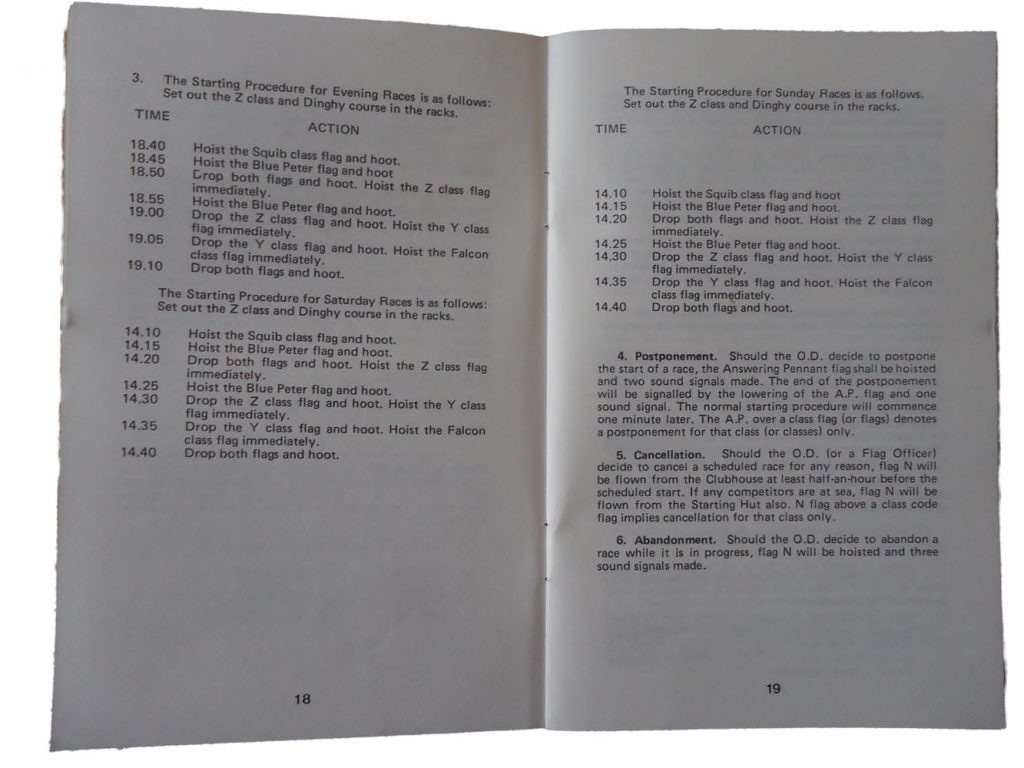
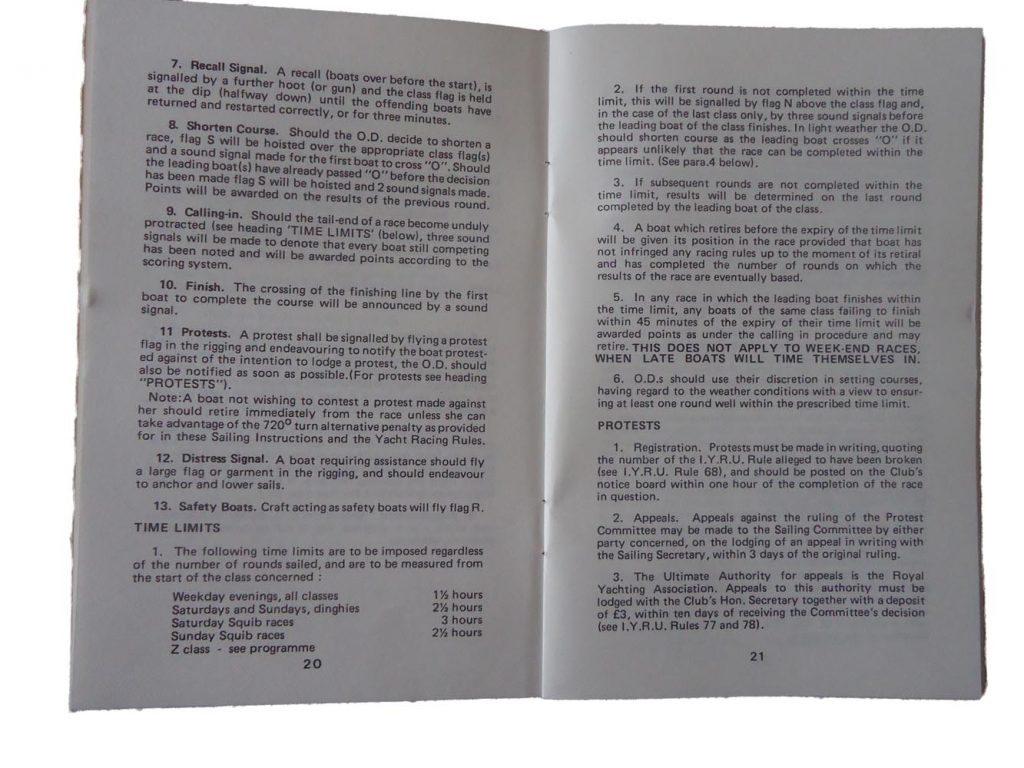
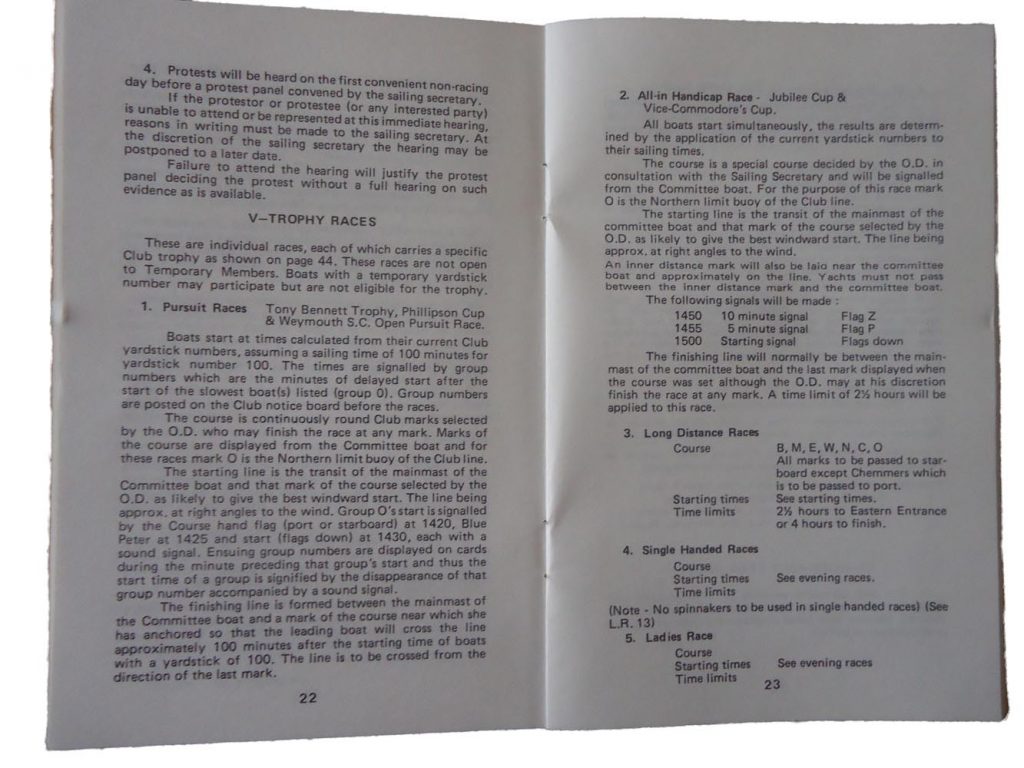
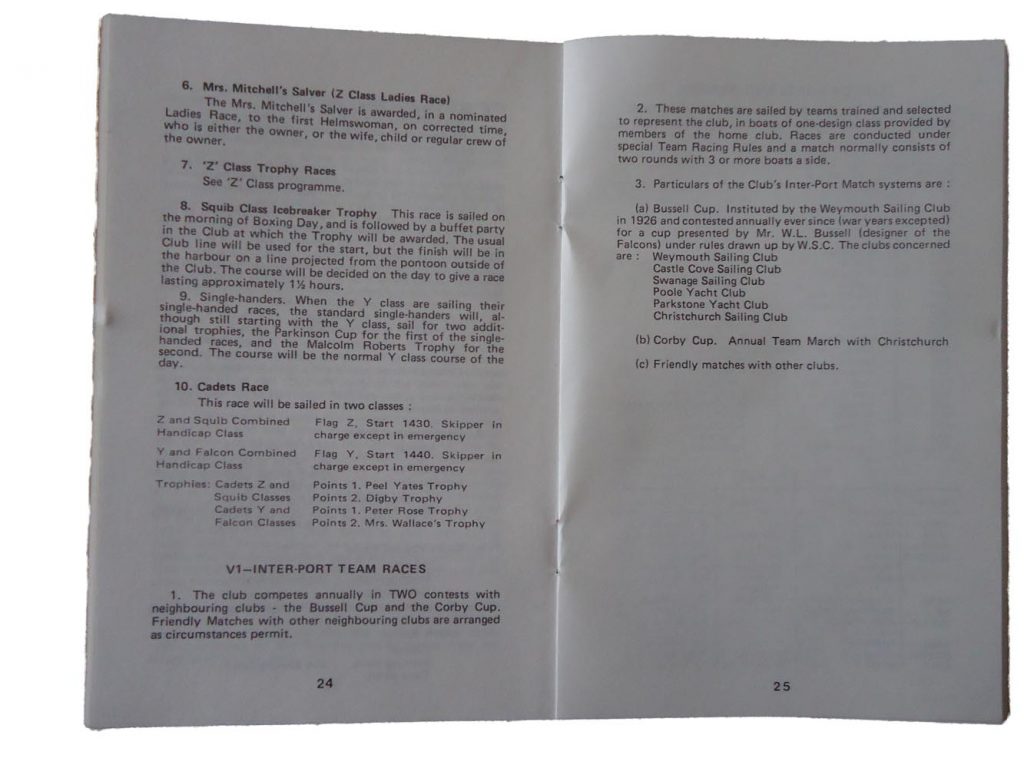
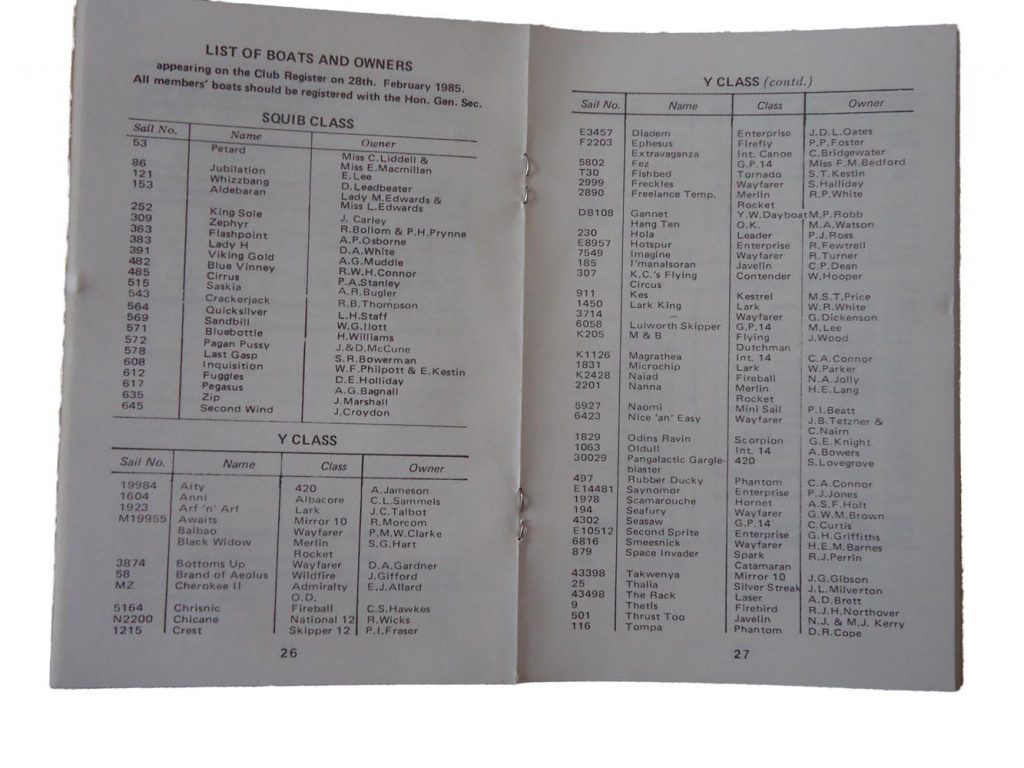
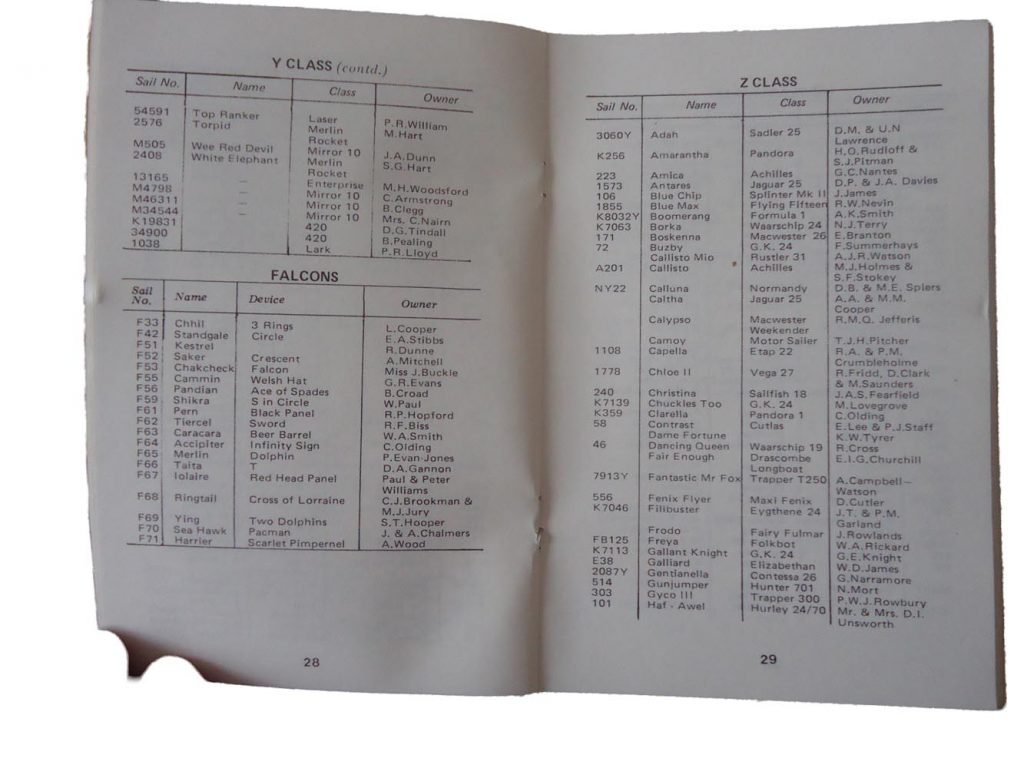
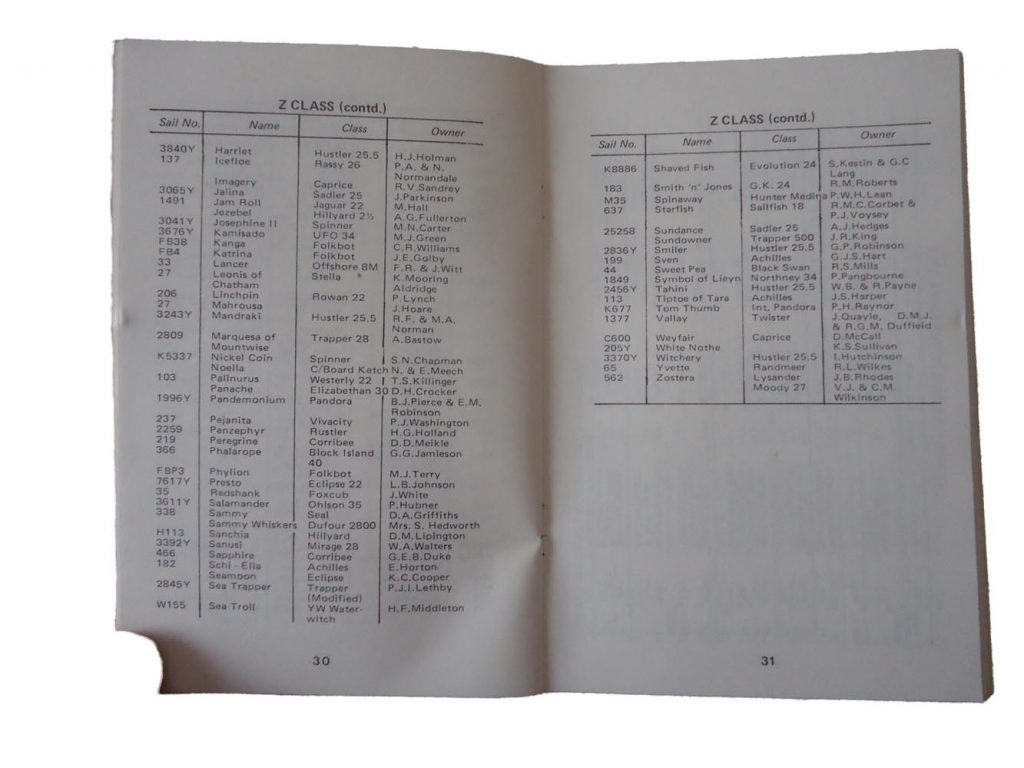
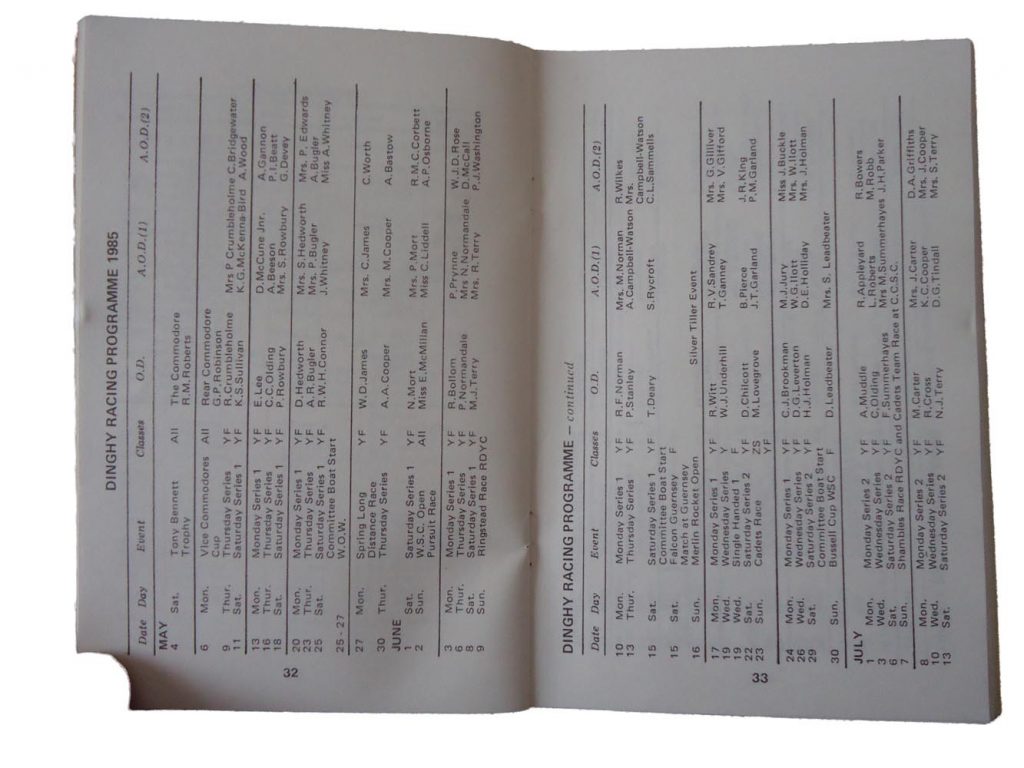
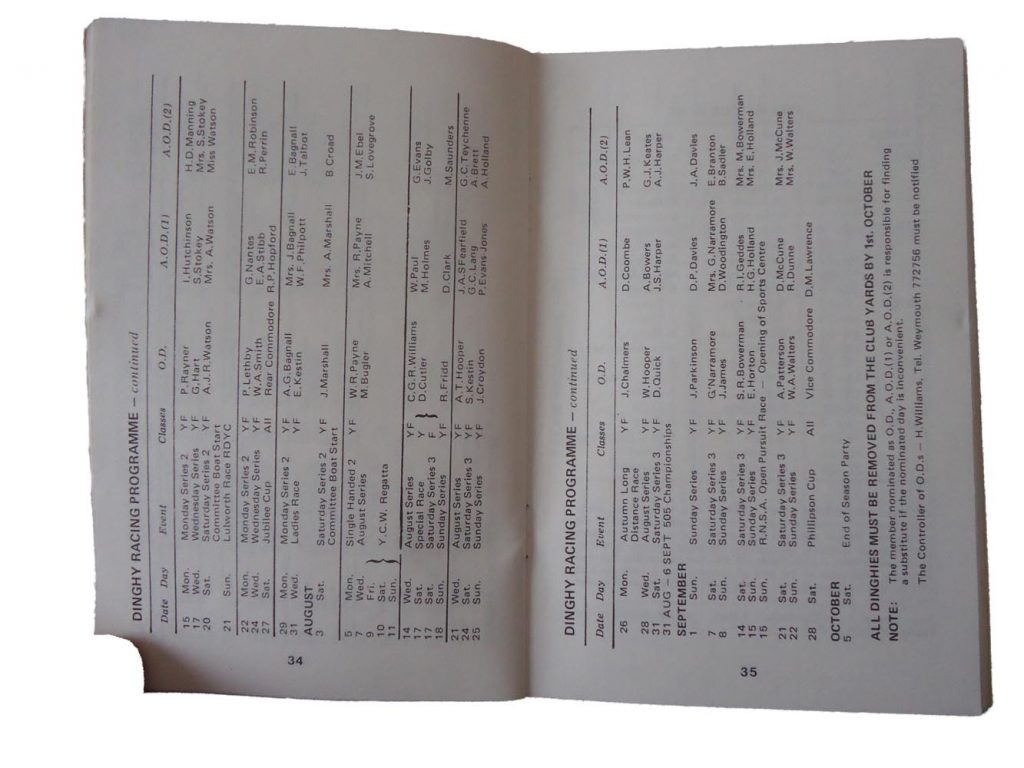
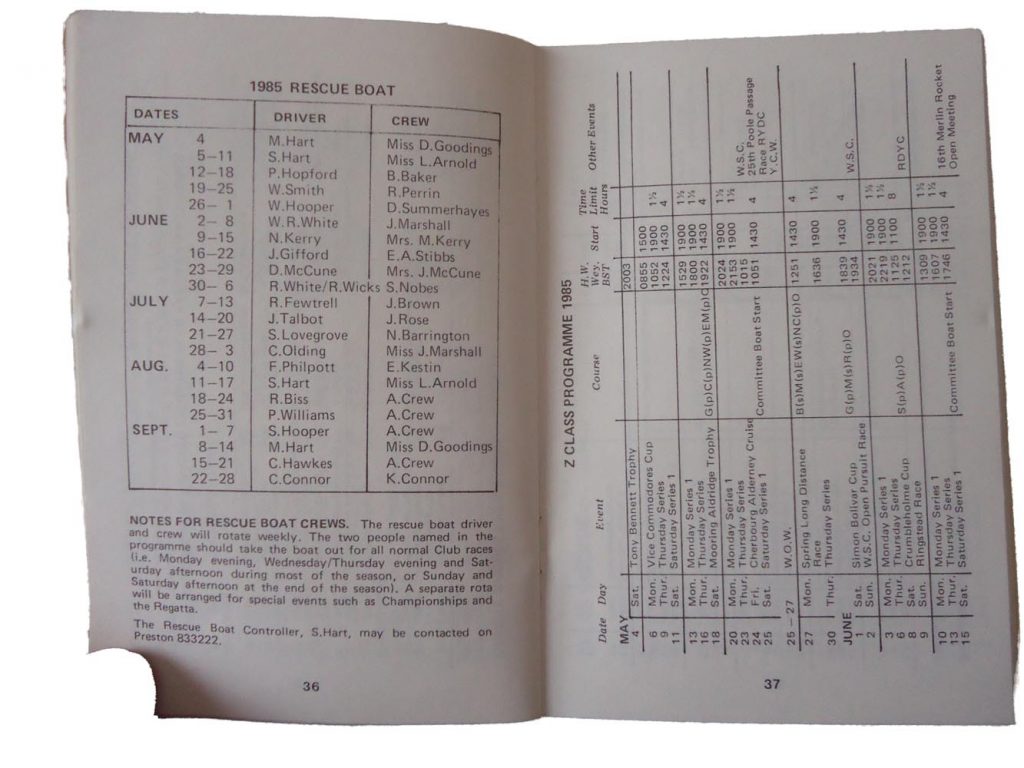
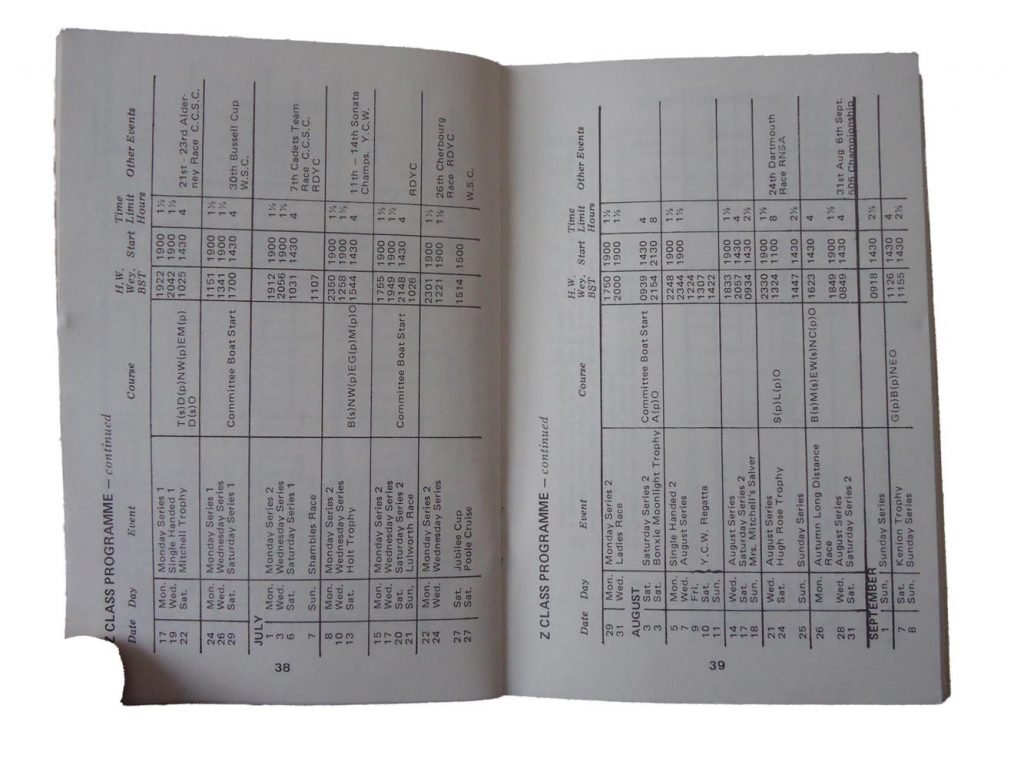
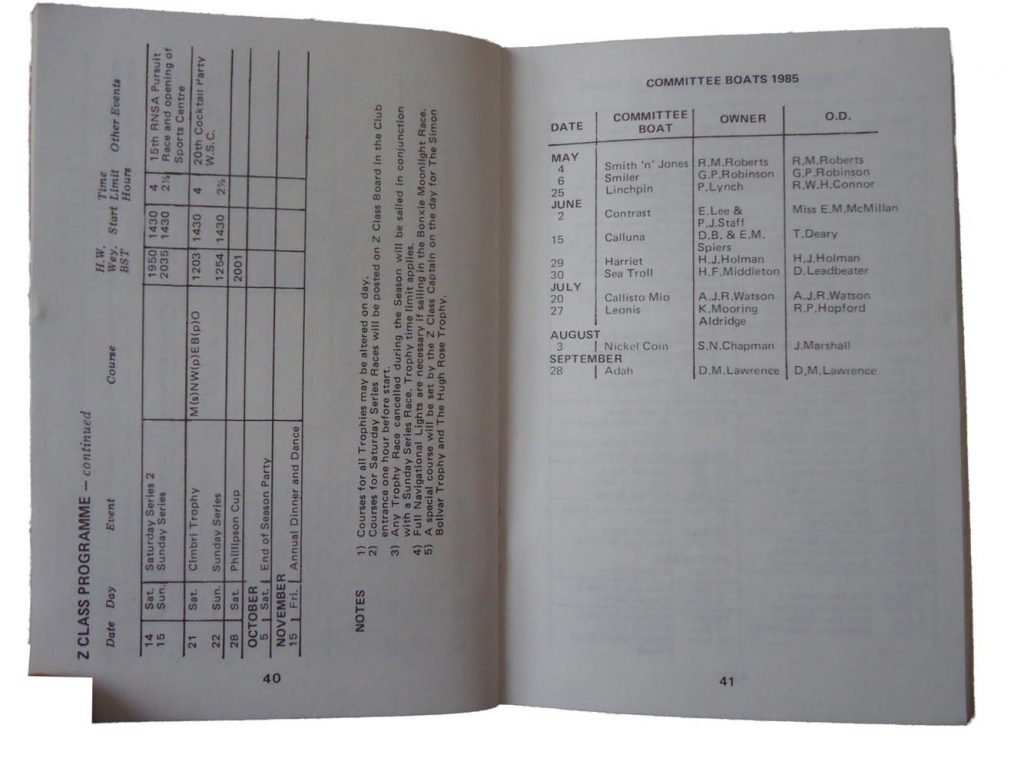
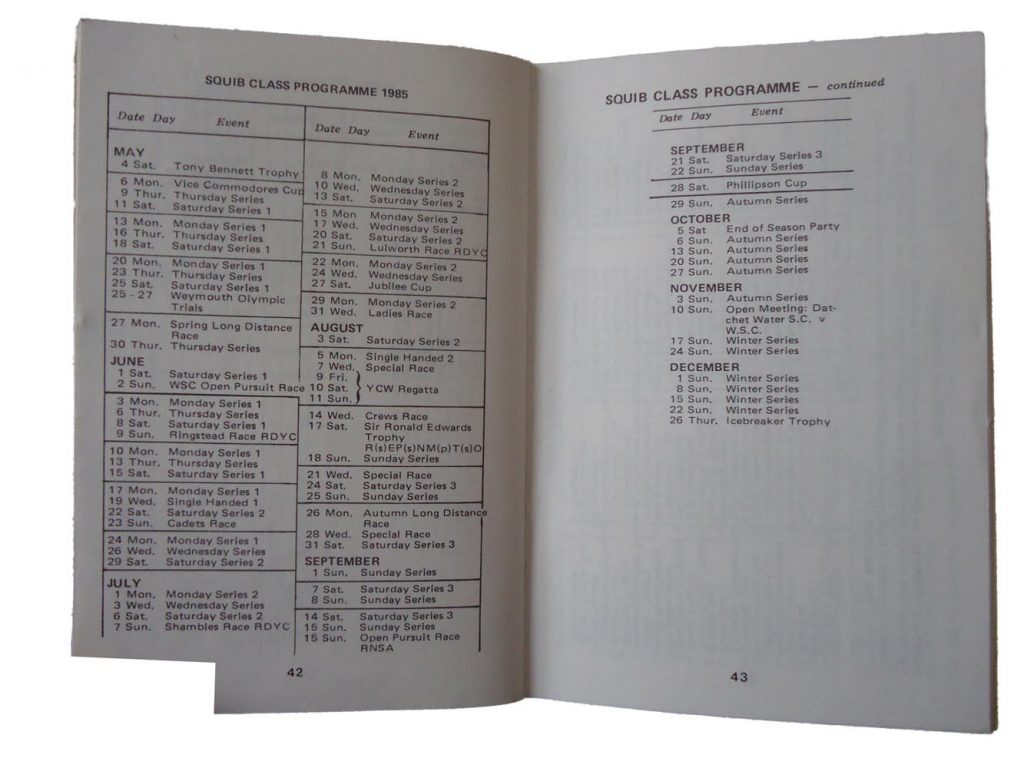
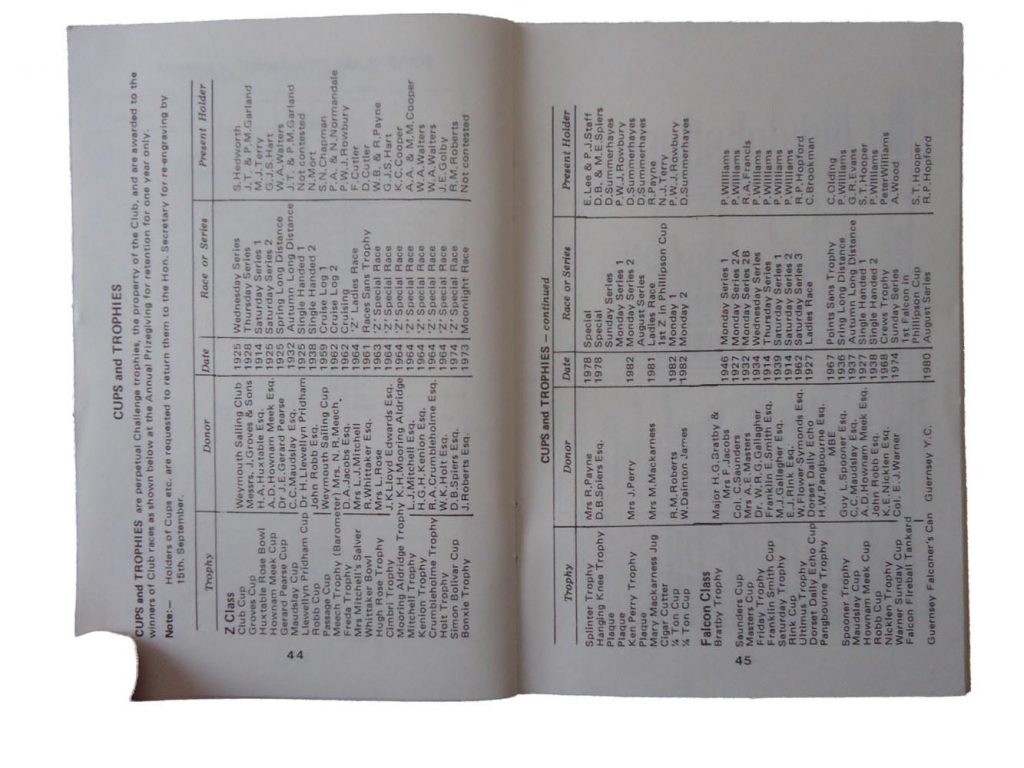
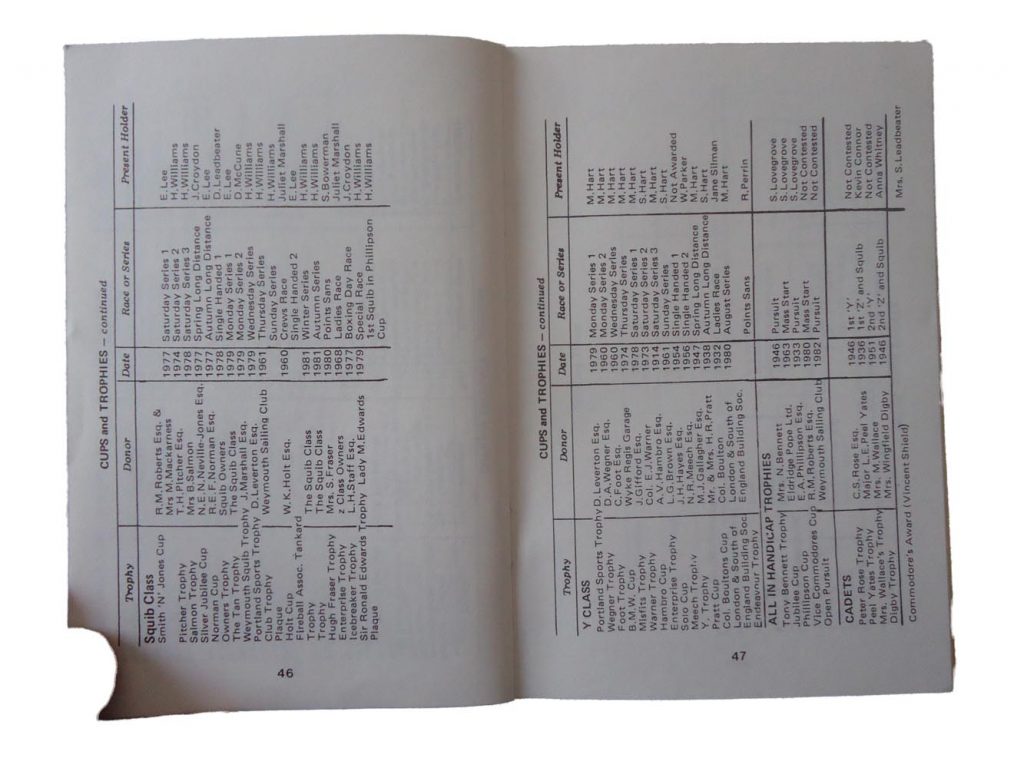
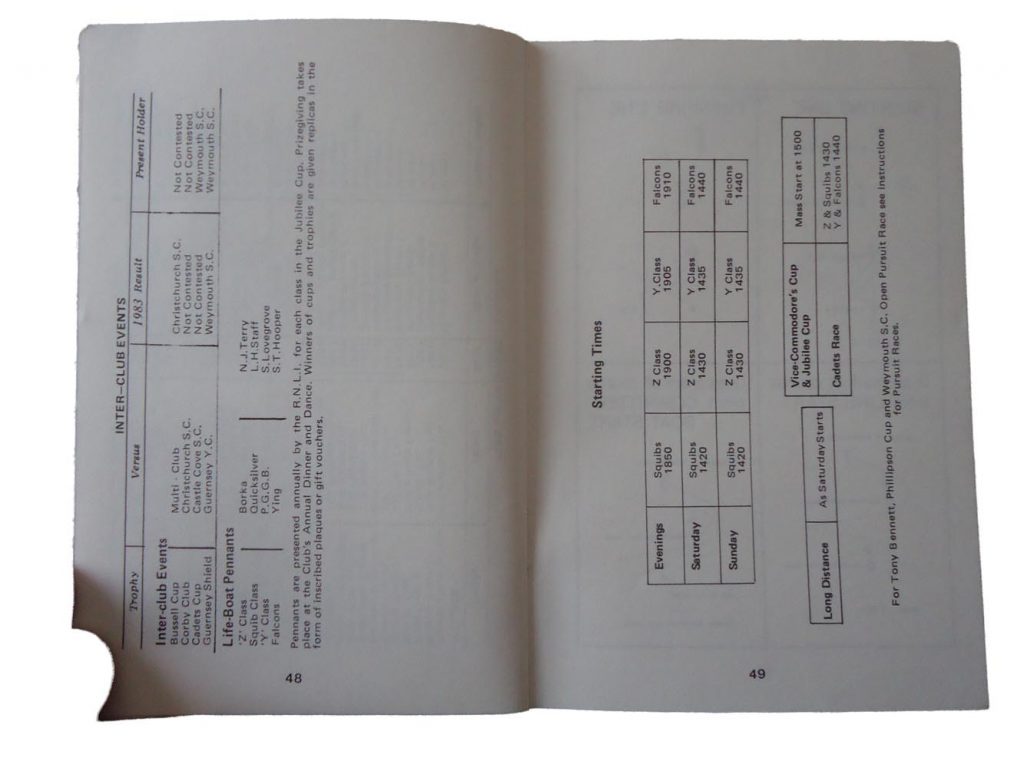
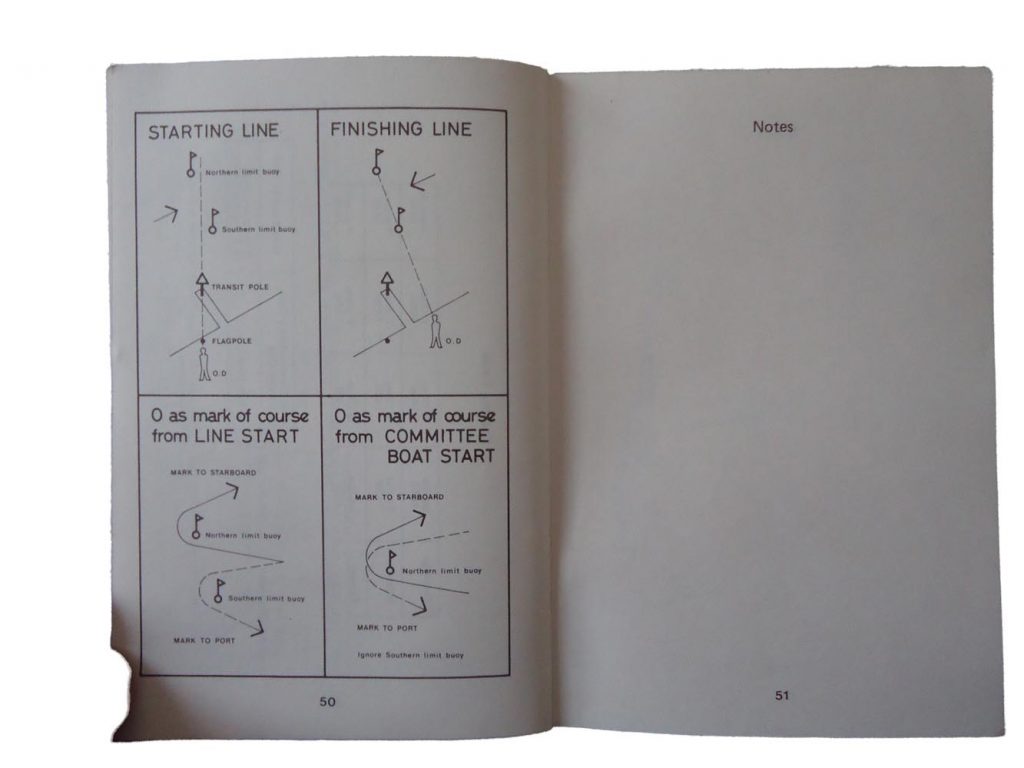
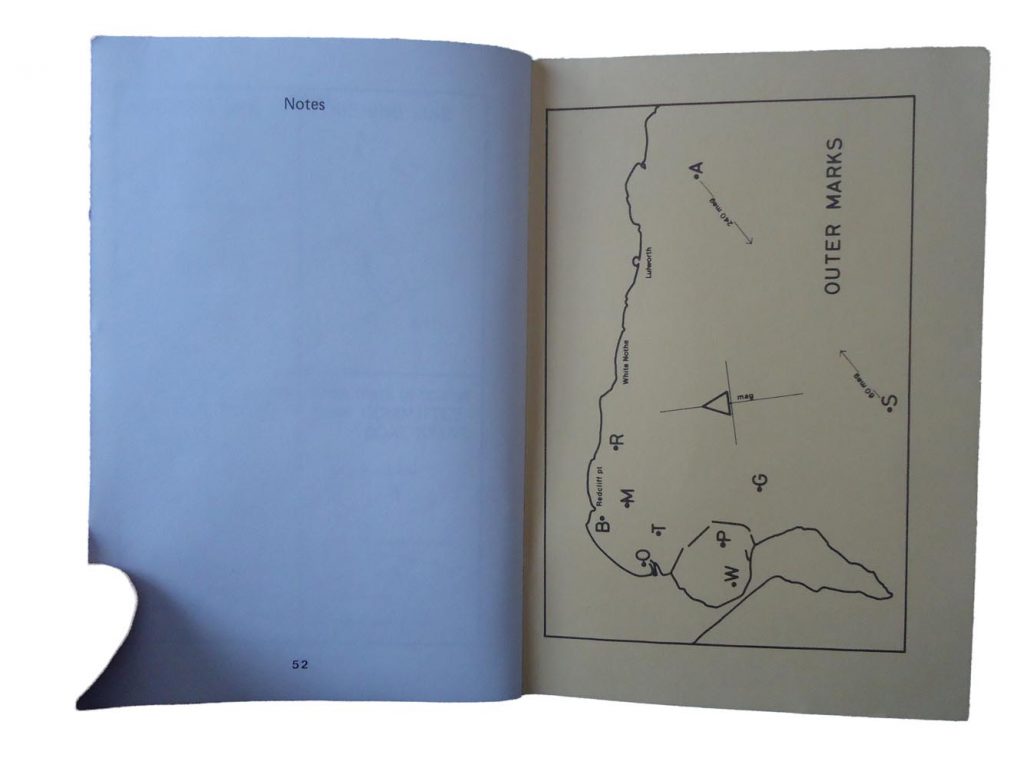
DEDICATED to the members of the Weymouth Sailing Club who gave their lives for their Country in the Second World War – Derek Beagley, Reginald Bratby, Harold Broadway, William Butler, John Pitcher and Peter Rose – and to all the elder brethren of the Club who have passed to higher service and calmer seas.
This book began with the unearthing, from a forgotten shelf, of a collection of Minute Books dating back to 1902. They contained some interesting facts about the Club’s beginnings and were handed to me to ‘write them up into a history’ – a document which Hugh Rose undertook to publish in a limited edition on the Club’s behalf.
My little task turned out to be quite a big one. The books contained scents which had to be run to earth, stories which called for explanation, gaps which needed bridging and deadwood that had to be pruned. It took a long time but it was interesting. If the result interests my readers half as much I shall be amply rewarded.
I do not claim to have turned every stone or explored every avenue, and doubtless certain facts and stories have been missed. Others have been omitted purposely either because un-historical, uncorroborated, liable to cause offence, or all three. The sources I have used I wish to mention and acknowledge.
For the Minutes themselves I am indebted to the almost unbroken chain of Hon Secretaries who have provided the true and faithful records which form the backbone of this story. Among these, a special mention must go to Mr. T. R. Wakefield [1914-24], whose entries are a model of neat exactness, interspersed with frequent press cuttings full of interest to the historian and perhaps included for this very purpose.
My thanks are also due to the proprietors of the DORSET DAILY ECHO for granting access to their files, to Mr. F. W. Gill for press cuttings, photographs and personal memories of the Franklin Club; to Mr. A. D. Hownam Meek and Mr. F. R. Hillier [snr.] for their recollection of the Club’s beginnings; to Dr. Llewellyn Pridham for the loan of photographic blocks; to Mr. E. Wright for records and particulars of Falcons, and to Mr. R. C. Flisher for verification of the later passages and for valuable help in checking and editing the proofs.
I wish to include a ‘thank you’ to each of my typists, Mrs. H. Phipps and Miss M. Hayes, and to extend a special word of gratitude to Mr. G. H. Rose without whose co-operation this book would never have been printed.
NOTE from Rita Payne in 1994. When I agreed to research and write a continuation of the Club history, I suggested that there should be a reprint of Vol 1 written by Jim Hayes. The following script is a copy of the original book plus the first publication of Vol.II, also by Jim, which I was surprised to find amongst Club records when I started my researches.
In reproducing these documents I have stayed with Jim’s original spelling and punctuation and must express my thanks to Gill Gwinnell, Chris Liddell and Elizabeth Macmillan for the time they spent in checking these details.
I must also thank Elizabeth Macmillan and David McCune for their help in converting my discs to a format which can be used by our printer.
I hope that you enjoy reading this history which shows how much we owe to the founders of our club and which is a fitting memorial to its author, Jim Hayes, who departed from our midst on 6th July 1981.
I appreciate the honour of being invited to write a Foreword to this little book – the history of a Club with which I was closely associated for several years. A wealth of information has been accumulated between the covers, and is woven into a sea-salty story which should have a wide appeal.
When the proofs were put into my hands I was unable to set them down again until I had turned the last page. I found the story most absorbing, and the breezy touch with which the facts have been put down contributes to its readability.
Dr. Palgrave Simpson, as you will read, launched the first Sailing Club in Weymouth. I can remember this popular Physician in his later years, driving along the Esplanade, seated in his gleaming brougham, behind a cockaded coachman and a pair of spanking greys. From his day until the beginning of the Second World War the whole tale is here. The reader will soon become aware of odd characters, strange craft, angry letters, furious protests, earnest Committee Meetings, races in all types of weather; and the hard-won recognition of lady membership.
It is not so very long ago since our masculine selves forbade the fairer sex to enter the Club buildings -‘the females’ being looked upon with suspicion if not alarm! I can well remember the acrimonious debate which took place to decide whether they should be invited to the Annual Dinner. Yet these gracious ladies now wield a power to be reckoned with, and Lord knows what authority is exerted behind the scenes!
I wonder do Club members realise the extent of their good fortune in being admitted to such a fraternity of the sea? One has only to enter the Club premises to be charmed by the cordial and friendly atmosphere; people are there to sail, and all of like mind are welcome. And how conveniently the Club is placed, in the centre of the harbour area, yet within fifty yards of a car park, with boats so accessible that it is almost possible to board them straight off the quay wall. Moreover, a member can be afloat at any time-o’-day, regardless of tide tables – the harbour never dries out! This is a dispensation of Providence which is only realised when neighbouring clubs are visited, their programmes being dependent upon times of high and low water.
Then how sheltered are the moorings, protected from the four winds by the tree-covered Nothe on one side, by Georgian terraces on the other, and most probably by a Jersey boat looming gigantic in the narrow harbour. While outside ‘the haven under the hill’ stretches one of the finest pieces of water for yacht racing round the shores of Britain, the Bay being protected by chalk cliffs to the northward, the town to the westward, and the massive rock of Portland with its breakwaters to the southward. The Bay is only unpleasant when the wind blows from the east, creating a horrid popple more sea-sick-making than dangerous.
Yachting is often quoted as ‘the sport of Kings’, but the tricky art of small boat sailing is the sport of poor men too. And what better small boat could one want than a FALCON? Ideal craft for their purpose, cheap to keep in the water, easy to scrub, Bermuda rig, no falals, and able to stand up to any reasonable weather when crewed with three to sit ’em up.
Even in our most optimistic moods we never dreamed when launching the first batch in 1927 – my SPARROWHAWK first of all – that nearly fifty of these little ships would come off the stocks in the next twenty-five years, or that twenty-four would ever be available to take part in a single event. The finding of new names must be quite a problem, all possible falconidae having apparently been used, including such bizarre ones as Katabella, Crecerelle, and Chhil, and such a tongue twister as Iolaire. The other day I discovered a new one – Falconet – and doubtless others will be forthcoming to take their places in the ranks of fame.
In this book the Club now possesses a record of its career from the very beginning. The compilation of these facts and their conversion into literature has, no doubt, been a source of pleasure to the gifted author, but nevertheless, we members are indebted to Jim Hayes for a job of work which has been admirably performed, skill and strategy with the tiller-hand having been transferred to navigation with the pen.
The formation of a Sailing Club in Weymouth was first projected at a meeting in the Guildhall on a spring evening seventy years ago – March 15th,1882.
The proceedings of this historic conference are clearly recorded in the SOUTHERN TIMES of that day, of which the relevant extract has happily been preserved. From this report it appears that a certain Dr. Palgrave Simpson gathered together a score of local yachting enthusiasts [the Mayor presiding] and explained to them his proposals for the formation of a sailing club -‘for the good of the town and the amusement of those who visited it.’
In his preamble this sea-loving doctor deplored the fact that ‘such a lovely bay was not more used for sailing … the only competition being the annual August regatta,’ and he voiced sound basic principles when he said that ‘the object he had in view was purely the love of sport, £.s.d. being far in the background.’
He proposed to hold races [‘sailing competitions’] every Wednesday evening, and had drawn up a set of rules [based on Y.R.A. lines] which he then submitted to the assembled company. These rules met with instant acclaim, and it was promptly resolved to form the projected club ‘to promote boat sailing and the navigation of small craft.’ The officers were enlisted by Dr. Simpson, as follows; President, Capt. Phelps; Vice President, Col. Swaffield; Commodore, Capt. Downes; Vice-Commodore, Mr. Fitzherbert; Rear-Commodore, Capt. Chimmo, R.N., Hon. Sec., Mr. E. T. Smith; and among those present we note the names of Mr. Talbot, Mr. Learmouth, Mr. H. Warren and Mr. Bussell [a sailmaker] .
The press report aforesaid gives us glimpses of the characters of some of these noble pioneers, mostly through the twinkling eyes of Dr. Simpson. Thus ‘Col. Swaffield [who had always been knocking about in yachts] was so smitten with the idea of having a sailing club that he was off to Cowes to buy a small boat at once.’ The Commodore must have been a man of means, for he owned both a I5-tonner (the George) and a 4-tonner (the Ethel). The Vice-Commodore elect had another hobby, for he was expected to accept the post when he returned ‘from his usual shooting expedition in South Africa’; while the Rear-Commodore had ‘a nice steam yacht with which he could pick up those who carried away their boom or tumbled overboard.’ Capt. Chimmo’s mantle has surely fallen upon Mr. Moyes!
The course seems to have been an enlarged version of the present ‘0’ course, with a buoy ‘down towards Osmington’ and a mark boat off the Burdon Hotel, the start being ‘across an imaginary line to the N.N.E. of the pier. ‘There were to be three classes [20-30ft, 15-20ft, and under 15ft.] and an automatic handicapping system was instituted whereby the winner of a race owed 2 minutes upon each occasion of coming first until beaten twice.
Two boat-builders, Messrs. Talbot and Carter, looked forward to plenty of work, and the proposer of a vote of thanks to Dr. Simpson said that ‘the scheme should receive all possible support because it was likely to attract visitors. In his experience the
friends of competitors always evinced great interest in the result of a race, and something more was needed than one great grand annual regatta.’
Dr. Simpson modestly transferred the vote of thanks to the Mayor, to whom he said ‘he had only played second fiddle’, whereupon the momentous meeting ended, and the first Weymouth Sailing Club was born.
Here, for lack of further material, we must leave these happy pioneers, whom we may imagine jostling round their appointed course any Wednesday afternoon in their peaked caps, reefer jackets, and tight trousers – boatmen luffing big-game hunters, and Colonels vying with post-Captains R.N., while the Rear-Commodore appropriately brought up the rear in his ‘nice steam yacht’ waiting for someone to capsize in a standing gybe, all to the great amusement of the kindly Dr. Simpson, and all for the love of the sport [or ‘the good of the town’] with £.s.d. ‘far back in the ground.’
Thus the foundations of our present club were laid down in the slow strata of calm Victorian summers, disturbed only by faint ripples from the Boer War [‘no shootin’ expedition this year, damme!’] until the turn of the century, the death of the Queen, and the close of an era of ordered dignity and peace.
How long this original club survived we cannot say, for after this first record it vanishes into obscurity, and we find no further reference to a sailing club for a lapse of twenty years.
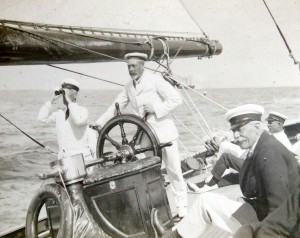
King George V racing his J-Class yacht ‘Britannia’ in Weymouth Bay. Mr Bussell is in the right foreground.
When King Edward VII came to the throne in 1901, he led a nation-wide revival in all forms of sport, yachting being not the least. Some eddies from this gale of enthusiasm must have awakened the sleeping sails of Weymouth, for the Club preserves an old Minute Book inscribed with the imposing title ‘The Weymouth Corinthian Yacht Club,’ and embellished with a membership card for the season 1902. The first entry of this interesting document records a meeting at the Victoria Hotel in March, 1902, at which those present were ‘desirous of having a Corinthian [Yacht] Club on the lines of the old Corinthian Club’.* Mr. Harry Aylesbury took the chair, and undertook to subscribe £5 – 5s. and a cup for competition. ‘Surgeon-Major’ C. L. Cunningham also promised £2 – 2s. and a cup, and ‘suggested that ladies be admitted, should they be small boat owners.’ His proposal met with no opposition, but the first membership card shows none of the fair sex on its list of twenty ordinary members, which includes such well known names as Bennett, Hurdle, MilIedge, Sargeant, Thalbot and Webb. This also shows fifteen officers. including seven vice-presidents. The election of a Commodore seems to have met with some difficulty, for Dr. Cunningham, though listed, only took the office pro tem, after refusals had been received from Mr. Aylesbury and Major Crawford [neither of whom joined the club].
Later we read that ‘at a smoker in the clubroom on May 23rd; Dr. Cunningham proposed Mr. E. Mitchell Smith as Commodore, and Mr. Learmouth as Vice-Commodore, both being duly elected. This ‘clubroom’ was at 4 York Buildings**, a Georgian bow-fronted house near the Royal Dorset Yacht Club, and was rented at £1-1s. per week for the first two months ‘after which it must be settled where the club room is to be.’
The political tension of the time between the two great rival parties, Liberals and Conservatives, is illustrated by an early decision that politics must not be brought into the club in any way and also by a member’s objection to electing Col. Brymer [Conservative M.P. for Dorchester] as a Vice President ‘unless it were possible to have a representative of both parties’.
The re-formed club made its debut, rather inauspiciously, with an ‘opening cruise’ by three yachts – Olenda, Adriane andTheodora – which, we read ‘left the pier head at 3 o’clock on May 15th. The yachts cruised about the bay for about l½ hours, following the Commodore’s yacht. They tacked across the bay about five times, and then, owing to rain and coldness, had to come in.’ We can picture the Commodore, Vice-Commodore and Hon-Treasurer [Messrs. Cunningham, Learmouth and Mitchell-Srnith] stowing their wet sails with numb fingers and consoling each other with the knowledge that at least they had done the right thing by the club!
* The original organization was primarily a social club with premises near the Royal Dorset Yacht Club on the Esplanade.
** Once the present writer’s lodgings.
Another early entry in the minute book records the origin of the present ‘A’ course, it being decided that ‘the course for races should be a triangular one, a barrel being moored off the Old Toll Gate, and two pieces of triangular wood with a flag as the other two buoys.’ The layout of the course does not appear to have pleased everyone, for we read that ‘on July 19th a meeting was held on the pier-head at 8 o’clock, at which, after much discussion, it was proposed that the old [original] course be adopted.’ The fact that this resolution was carried unanimously suggests that all the dissenters were finally converted!
In its first season the club ran a series of eight fortnightly races for ‘Yachts’ on Wednesday afternoons, and Saturday races were scheduled for ‘open boats’ and ‘Raters’. Six boats competed in the Yacht class, but only two each in the Saturday series, of which only two or three races were sailed.
The club’s method of awarding points for series races is worthy of note. It is set out in the contemporary book of rules under rule 6, which reads:-
‘As far as funds will admit, the prizes will be awarded as follows for every race after the first three:- One prize to the winner of each race. Points will be awarded at each race to every boat completing the course, the last boat to receive one point, the last but one, two points, and so on to the winner; and at the end of the season the value of those points shaII be paid to the competing boats.’
The ‘value of the points’ was adjusted to suit the club’s finances, but in any case, everybody got something [£.s.d. rearing its ugly head!] and winners were rewarded in proportion to the number of boats in the race – a very logical idea which provides an interesting alternative to our present scheme of ‘winner always scores ten.’
The first Prize-giving took the form of the evidently popular ‘smoking concert’, given at 4 York Buildings [still] by the Commodore, Mr. E. Mitchell Smith. History does not relate whether the promised cups materialised, but first prize in the Yacht class went to a young boat builder named W. L. Bussell (the club’s official treasurer) with a cutter named May.
At the A.G.M. of 1903 (held in the Drill Hall, St. Alban Street on January 23rd) the treasurer’s report showed a credit balance of £4 and this was received ‘with much satisfaction’. Mr. Mitchell Smith was re-elected Commodore, and Dr. Cunningham, who was elected Vice-Commodore, also offered to act as Secretary, his predecessor, Mr. E. Bag having apparently departed. A prophetic note was sounded at this meeting when our friend Mr. Bussell ‘proposed that the name of the club be changed from ‘Yacht Club’ to that of ‘Sailing Club’. This democratic idea was evidently considered in bad taste, however, for ‘no seconder being forthcoming’ the motion was withdrawn.
Other resolutions passed at this meeting included a reduction of the subscription for non-residents from a guinea to 10s-6d [the resident’s subscription] and a project for ‘the purchasing or hiring of the Minima clubhouse,’ a wooden hut at the end of the Nothe Quay.
The latter negotiation evidently fell through, because a subsequent minute refers to ‘the new clubroom in St. Thomas Street’, the arrangements for which were entrusted to the committee members. At one of their meeting the question of allowing spinnakers or booming out of headsails was hotly disputed. Opinions being equally divided, the Commodore gave his casting vote ‘against’ and we read that Mr. Learmouth [an old die-hard], entering the room about this time, was appealed to for his opinion and replied ‘against’. One wonders what would have happened if he had answered ‘for’.
Among other items of interest gleaned from the minutes are, [1] the receipt of a letter from Sir Thomas Lipton, thanking the club for its ‘sympathy and courtesy’ (presumably in reference to his loss of the America Cup and to the club’s custom of escorting the Shamrocks back to harbour after trials in Weymouth Bay]; [2] the start of a search for a paid timekeeper; [3] the acceptance of Dr. Cunningham’s offer to put out the mark buoys for £3 10s. per season, and [4] the adoption of sailing partially-decked and open boats, and to race them on alternate Wednesdays and Saturdays respectively at 3 p.m. . Presumably there was no afternoon Jersey Boat in those days!
A copy of the membership card for 1903 [thoughtfully pasted in the minute book] bears on the front the club burgee – dark blue with the town arms on a white shield. This card shows thirteen officers including seven Vice-Presidents. By an oversight the names of the four committee members are omitted, but the back cover gives the names of the twenty-four ordinary members, including three ladies [Mrs. Cunningham, Mrs. McCracken, and Miss Symes] and such further notables as
H. Vincent, R. R. Talbot, J. Sherren, and ‘Hawkes Freeman & Co.’
Also listed are the names, owners and rigs of eighteen boats – nine cutters, six lug-rigs, one yawl and one motor launch [a proud innovation]. The fixture list starts with an opening cruise for all [May 13th] followed by nine races for each of the two new classes; and the rules, which include an exclusive definition of the word ‘amateur’, end with the curious injunction ‘No political or theological subject shall be discussed at any meeting of the club or in the clubroom. ‘
In the pages that follow we sense an element of unrest in the club. The first protest is recorded on August 28th, when Mr. Learmouth wrote a letter ‘objecting to Major Alexander scoring two marks on July 29th; as, to avoid a collision he ought to have gone round through being on a port tack, which he did not, so I went about and got becalmed.’ This dispute was settled by the unorthodox expedient of re-sailing the race! Another entry, heavily scored out in pencil, reads: ‘Dr. McCracken, having accused the Secretary of ‘paddling’, the accusation was flatly denied by that official, [Dr. Cunningham] and, on the accuser qualifying his statement by saying ‘well, you moved your tiller about too much’ the next business was proceeded with. This entry seems to have caused a flutter, for at the following meeting we read ‘Minutes of the last meeting read, but not confirmed or signed. The acting Secretary thereupon handed the minute book over to the chairman, and took no further notes of the proceedings. ‘
Dr. Cunningham’s umbrage seems to have been permanent, for at the next meeting the minutes record the tendering and acceptance of his resignation, and the election of the unrepentant Dr. McCracken in his place. Soon after this Dr Ryding also resigned ‘because he did not think the majority of the members understood what an amateur was.Õ
The fractious season ended with the award of six prizes, four in class 1, in which Mr. Bussell’a May took Mr. Scartbrick’s new cup [Value £5-5s] and two in class 2, headed by Mrs. McCracken’s lone with Mr. Aylesbury’s cup [value £3-3s]. Owing to unfavourable weather at the end of the season, only five races were sailed in class 2, and we read that two of the prizes, a biscuit box and a cruet stand, were therefore not awarded.
The A.G.M. of 1904 took place in the Guildhall on May 2nd, under the presidency of the Mayor, Major H. J. Groves, and is fully reported in a press-cutting thoughtfully appended in the minute book. The Secretary’s report is interesting in its foreshadowing of a one-design class, a concept destined to bear fruit [in the form of Falcons] twenty-five years later. This report was prepared and read by Mr. Bussell, who explained that the late Secretary Dr. McCracken had left the town. ‘The season 1903,’ said Mr. Bussell, ‘opened with great encouragement … and was fairly maintained to the close. The greatest trouble the committee had was to fix the time allowance for the several boats, they all being of different types. When I say we had a Fife’s one-design class racer sailing with a 14ft. house-boat, you will agree that it was a task very few gentlemen would care to undertake; but, after several test matches and sundry alterations, an allowance was arrived at which was considered by the majority as fairly accurate. In order to obviate this difficulty in the future, the committee are hoping that some gentleman will build a craft which will be adopted as a club design, suitable not only for racing but for pleasure and fishing; for, if such were the case, we feel sure several gentlemen would be induced to take the matter up and much greater sport would be derived than at present.’ Prophetic words!
Mr. Bussell continues with a moan about the weather which was ‘of a very unsatisfactory character – on several occasions crews had to return to their moorings in a very salty condition, which was nevertheless enjoyed,’ and referring to the public interest at the pier-head he says, ‘it has always been an unwritten law of the club that if anyone wishes to sail the course they are heartily welcome, provided accommodation can be found.’ He ends with the hope that ‘during the coming season several landsmen will be found enjoying the sea breezes, which cannot be properly felt on shore.’
The Treasurer’s Report again showed a credit balance of £4 after meeting expenses amounting to £25, the membership having risen from thirty-five to forty-six. In proposing the adoption of this report, our friend Mr. Bussell again foreshadows coming events by deprecating the expense of an inland club-room, rented so that ‘members residing out of town might have a room where they could sit.’ Personally Mr. Bussell did not think it wise ‘unless one could be had nearer the water.’ He also undertook to display the club notice board on his premises.
Mr. Mitchell Smith was re-elected Commodore [third term] and the new Hon. Secretary was Mr. W. H. Roberts of 64 St. Mary Street. The meeting concluded with a long speech from the Mayor in which he stressed the municipal value of a club fostering ‘the art and science of sailing,’ eulogised the natural beauties of the town [unrivalled except by the Mediterranean’] and went on to outline municipal developments including ‘gardens, recreation grounds and motor omnibuses.’
The rules in the 1904 membership card show no appreciable change, except that the course is defined as ‘to be sailed with marks to starboard,’ and time limits are fixed as ‘two hours for the first round, and three and a half hours for the second.’ The regulation about politics and religion is quietly dropped.
Committee meetings this year were mostly held at 4 Gloucester Row, by invitation of Dr. Liddon Green [Hon. Treasurer]; and in the minutes we read of the appointment of a Mr. Murphy, R.N. as timekeeper for the season with a remuneration of £2.
The season opened with the usual ‘cruise’ [June 1st.] followed by eight fortnightly fixtures in each class. It was decided to award an additional prize ‘not exceeding 5 shillings in value to the first boat in every race so far as funds permit,’ the actual sum being 3s 6d. The series aggregates in class I resulted in a very close finish, Mr. Steadman’s rater Waterwitch, described by Mr. H. W. Gill, who usually crewed her, as ‘a 17ft. skimming-dish with canvas decks, blood-red sails and a dagger plate,’ winning with eighteen points, followed by a tie for second place between Lieut. Hipsley’s Kelpie and Mr. Bussell’s cutter May with sixteen points each. These two shared the prize money and received 30s each. In class 2 only two matches came off, owing to lack of support, so a consolation prize of 10s 6d was the only award.
At the beginning of 1905 the sailing rules were completely revised, and the report of the A.G.M. of 1905 says that ‘they have now been made much more clear and satisfactory, as well as making provision for visitors having craft and wishing to sail in club fixtures.’ This ‘revision’ consisted in [a] omitting from rule 2 a clause obliging visitors ‘having boats and wishing to sail’ to become honorary members, and paying an entrance fee of 2s 6d, which entitled them to sail in two races only; and [b] modifying rule 3 to allow any amateur to steer in a race under the orders of a member, instead of forbidding the tiller to anyone other than a member of the club. The term ‘amateur’ is defined in rule 4 as excluding ‘any person who has ever given his services on board for money, or received wages at sea other than in the Armed Services or Mercantile Marine.’ The final rather snobbish clause ‘nor to any artizan or other similar person in the habit of working for daily wages’ was dropped. The other rules remain unchanged.
In the Secretary’s report Mr. Roberts made an eloquent appeal for stronger support. ‘In Class I seven matches were sailed and secured very fair attachment’ [he said] ‘But in Class 2, after only two matches, it was found impossible to carry on owing to so few boats entering. The Committee trust that the club will receive stronger support [in future] and consider that what today’s Daily Telegraph describes as ‘the essentially British sport of Yachting’ should be one of the chief institutions of so ancient a port with such unrivalled waters, affording a safe and pleasant cruising ground, not to be excelled around the English coast.’
In the ensuing election of officers, we find the first mention of a familiar name among the Vice-Presidents, that of the Town Clerk, Mr. A. H. Huxtable, now associated with his famous Rose Bowl. After the election. the Chairman [Mr. S. Milledge] invited all present to adjourn with him to a smoking concert at the Marine Hotel.
The veteran Mr. Learmouth had been compelled to sell his boat and resign the previous year owing to failing eyesight, and, on June 6th, we read of his death – ‘a loss the members keenly felt.’ As regards the racing, Mr. Wallis was now engaged to put out the marks at the usual charge [£2], and Capt. C. Smith [late of the Chinese Lightship Service] was paid 2s 6d per race as timekeeper. The direction of the course was reversed on alternate dates [irrespective of wind!] and the winner of each race was presented with a winning flag [an improvement on the little cash prize, and worth reviving].
At this point it is recorded that a certain Mr. Nash, who had been offered the Vice-Commodoreship, had been obliged to decline it because he was only part owner of a club boat, and therefore precluded from office under the club’s rule 4. So a General Meeting was called on July 18th, at which this rule was amended to read ‘All flag officers must be sole or part owners of a craft on the club register.’ The obstacle being thus removed, the invitation to Mr. Nash was now re-issued and accepted. This timely [if ad hoc] piece of legislation provided an automatic successor to Mr. Mitchell Smith when he tendered his resignation as Commodore at the next A.G.M. [1906].
Despite the impassioned plea of Mr. Roberts, the races in Class 2 again had to be discontinued early in the season through lack of entries. Nine boats competed fairly regularly in Class I, first place again going to Waterwitch.
In submitting his report to the A.G.M., the worthy Mr. Roberts again delivered himself of a tirade against local apathy towards sailing. ‘Your Committee have again to deplore the extraordinary lack of interest taken by the townspeople generally in promoting the advancement of Weymouth as a centre for yachting, and the sailing of small craft. The success of similar clubs in places of far less natural advantage and smaller population make it a matter for astonishment that in this ancient port there are to be found so few privately owned sailing boats, and such a scanty number of enthusiastic amateur seamen. To further and encourage amateur yacht sailing is the object of the Weymouth Corinthian Yacht Club, and we feel that much has yet to be done to bring into the prominence it should most certainly attain, the unique advantages of Weymouth and its adjacent waters for the sport at once so healthy and so interesting.’
This oration was Mr. Robert’s swansong, for he is now compelled by pressure of work to hand over his pen to a Mr. Wiseman [a chemist] described by him as a man having ‘an abundance of zeal and energy on the club’s behalf.’
As already foreshadowed [and perhaps foreseen] Mr. Mitchell Smith resigned his Commodoreship at this meeting, after four years of office, with expressions of regret from all. Mr. Nash became Commodore in his place, and Mr. Bussell was elected Vice-Commodore with acclamation, the proposer describing him as ‘a man well up in nautical matters, and who takes a great interest in the club.’
At the first Committee Meeting of this season, the new Commodore gave his opinion that Prizes on the points system caused lack of interest to competitors who could not attend every race, and he therefore proposed that prizes this season should be given for each race individually. This drastic resolution was carried without demur. Mr. Huxtable promised a cup and it was proposed to hold the race for this on the same day as the Swimming or Rowing Club Sports ‘in order to have a good attendance of spectators.’ It was finally decided to race for the Huxtable and Scarsbrick cups on Regatta Day, and to allocate cups for the other races by lots, 2nd prizes in the two classes to be 5s and 3s 6d respectively.
The 1906 season’s races resulted in three firsts for Mr. Steadman’s Waterwitch in class I. The first winner of the Huxtable cup was Mr. Bussell in May and the Scarsbrick cup was won by Mr. Warren’s Ethel, which also won the prize presented by her owner!
At the A.G.M. for this year the Secretary’s report again deplored the lack of competing members, especially in class 2. One of the few races in this class had had to be abandoned ‘owing to a buoy having been cut adrift.’ The decrease in entries in this class as the season advanced was attributed to ‘the fishing’ .
Mr. Nash resigned Commodoreship in anticipation of absence during the season, and Col. Douglas was elected in his place, Mr. Bussell again being elected Vice.
Points worthy of note in Committee Meetings this year are:
[1] Re-adoption of the points system for all races, plus a prize of 5s for the winner of each individual race.
[2] Handicaps to be worked out on the results of the last two season’s races.
[3] If the flag for a race was hoisted before 12.30, the race should not thereafter be cancelled.
[4] A cup was presented by the Commodore, Mr. Nash.
The new Nash Cup was made the trophy for a special race, scheduled to be sailed on August 14th and open only to boats whose skippers had sailed in three or more previous races that season. The weather on this date turned out to be so bad, however, that only two eligible boats competed, and their owners both subsequently agreed that the cup was too good to be awarded under these conditions. It was therefore proposed to re-sail the race on September 18th.
On examining the records, it appears that the race on this stormy August 14th was actually won by a third club boat called Edna, newly acquired by a certain Mr. Hitchcock who was not eligible, by the terms of reference, to receive the cup.
Mr. Hitchcock evidently did not see the force of this argument, and although it was made clear to him that by sailing three races in the interim he had now qualified for the re-sail, we read that on October 7th he tendered his resignation from the club.
As a result of the season’s races, which included one in the Town Regatta [its first mention in the club’s annals], Waterwitch again carried off the honours with cash prizes totalling £2 14s. After paying out all cash prizes the club carried over a balance of £4 8s 2d.
At a Committee Meeting in the clubroom at the Crown Hotel on April 6th, Mr. Bussell once more proposed that the club be renamed the Corinthian Sailing Club, ‘the meeting considering the word “yacht” to be somewhat misleading.’ This time his proposal was carried, and it was agreed that the club should appear in Hunt’s List under the new name, ‘provided that the cost did not exceed 6s.’
At the A.G.M., held at the Crown on August 17th, the Commodore was re-elected and Mr. E. Smith was elected to the joint office of Treasurer and Secretary, both the previous holders of these offices [Mr. Green and Capt. Wilder] having resigned.
Mr. Smith’s labours were short lived, however, for he resigned on October 2nd, and the books of both Treasurer and Secretary were taken over by the factotum Commodore [Col. Douglas].
Racing points for the 1908 season were awarded on the system that each boat completing the course of a race received one point, plus three points for a first, two for a second and one for a third place. The winner of each race received 5s.
The season’s racing resulted in a win for Clara with four firsts, [£1] and 12 points [£2-4s] second Waterwitch 10 points [£1] and third Argula owned jointly by Messrs. J. E. Pearce and H. G. Pitcher.
This season saw the formation of a new class of ‘honorary member’ at a subscription of 5s per season, which entitled them to enter and sail a boat in any club race on payment of 1s per race. The project, however, does not appear to have netted much income.
At the A.G.M. the temporary-acting-joint-Hon.Secretary-Hon-Treasurer-and-Commodore [Col. Douglas] reported that during the previous year the President and Vice-Presidents of 1907 had not been asked, before the opening of the season, whether they would continue their support, and that appeals made to them at the end of the season had met with no success. As a result of this lamentable oversight, due doubtless to the many changes in the office of Hon. Secretary, the total subscriptions received amounted to only £6 16s. This loss of anticipated income from Vice-Presidents left a balance of a mere £1 10s. 6d. which, said Col. Douglas, would not cover the working expenses for the season without a guarantee of at least £4 in subscriptions.
It was decided, however, to carry on the racing programme as usual, and hope for ‘a small margin’ for cash prizes. The offices of Hon. Treasurer and Hon. Secretary were now entrusted to Mr. J. E. Pearse.
The election of a new President this year brought another familiar name to the club, that of Mr. Angus V. Hambro, of Milton Abbey [Conservative candidate for Dorchester].
The press report of the above meeting discreetly avoids any mention of financial anxieties, and after quoting a list of twenty-four Vice-Presidents including such influential names as Major Devenish, Capt. Foster, Mr. H. J. Groves, Mr. V. H. Bennett, and Mr. R Ayles [the Harbour-master] says:-‘Owing to the number of small racing craft that are now attached to the port ofWeymouth, and the fact that four or five of the officers of the Royal Engineers, Royal Garrison Artillery and Somerset Regiment have purchased craft and propose sailing with the club, a successful season should be assured, and we have no doubt the local “cracks” will have their work cut out to maintain their reputations. We understand that the Poole, Bournemouth and Bridport clubs are also particularly strong this season.’
A second newspaper-cutting phrased this less happily:- Officers of the RE., RG.A. and S.L.I. have acquired “cracks”.
On May 12th, we read, Mr. Hambro offered a Silver Challenge Cup, to be won three times in aggregate or twice in succession. This cup was presented to the club at a special meeting held on June 7th 1909. At this meeting it was agreed to present ‘photographs’ [see later] as second and third prizes in challenge cup races and the Mayor was approached with a plea for a better flagstaff.
This season – the financial prospects of which appeared so black at the outset – appears to have turned out remarkably well, and was concluded by a lavish dinner and Prizegiving held at the Crown Hotel on November 25th, and recorded in a contemporary press-cutting.
Among those present at this noble gathering we note such familiar names as Capt. Masters, Mr. Percy Graham, and Messrs. Gosney, Rowe and Steadman while those sending apologies included Major Devenish, Mr. Huxtable and Sir Alexander Pengilly.
After the company has disposed of a ‘capital spread’ and drunk ‘the loyal toasts with all honours,’ we read that the Mayor [Alderman W. Gregory] made a speech in which he said that he and his corporation [laughter] would do everything they could for the club. ‘They wanted the Corinthian Club, they wanted sailing vessels in Weymouth to attract the visitors.’ And he offered them a cup [value £5] ‘to be sailed for as they thought best.’ He then proposed the health of the club, which, he said, would be a valuable asset to Weymouth, a place which could not be rivalled on the South Coast.
Mr. Hambro responded suitably to this speech and Mr. Hurdle, who [as vice-president) also responded, expressed the opinion that it would be much better if the club adopted one class of boat, as it would give members opportunities for better seamanship [hear,hear].
At this point Mr. Hambro gave away the prizes, and here the report throws light on the ‘photographs’ previously referred to – they were pictures of Britannia, Meteor and ’20 tonners Racing’. Further toasts at this impressive dinner included ‘kindred clubs’, with mention of the Royal Yacht Squadron – Mr. Montague Guest having recently left the town – and of the Royal Dorset Yacht Club, regretting that the town could not see its way to presenting the usual cup, which had, in previous years ‘provided one of the finest sights in the Bay’ [presumably referring to the J-class yachts]. In the event of a similar default next year it was suggested that ‘the Corinthian Club should come forward and show a friendly feeling towards a club much older than their own.’
The press report finally records that ‘during the evening Mr. Mayo played violin solos, and songs were sung by Mr. Hambro, Mr. Graham, Mr. Hutchings and Mr. Pearse.’ – Those were the days!
The A.G.M., held in the Guildhall on May 31st, appears to have been uneventful. The Balance Sheet was passed as ‘very satisfactory,’ and the first race of the new season was fixed for June 18th. The office of Commodore was left open, Col. Douglas having resigned.
The Mayor’s Cup [to be known subsequently as the Gregory Cup] duly materialized, and was scheduled for competition on Regatta day. When it came to handicapping this race, Mr. Bussell hit on a brilliant idea for ‘passing the buck’, proposing ‘that the handicap for the [Mayor’s] Cup be arranged by an outside authority such as the Yachtsman, Yachting World etc., upon the result of the season’s sailing, up to the latest date before the race that the fairest handicap can be based upon.’
The proposal was carried unanimously, and the Hon. Secretary was duly instructed [August 9th] to forward results for this purpose to the Yachting World.
Whether or not the Yachting World complied in this rather arbitrary request, history does not relate, for at this interesting juncture we reach the last page of the minute book, and no further records of the Corinthian Sailing Club appear to have been preserved.
This club had been an essentially Edwardian product and it is perhaps significant that its dissolution should have coincided with the death of the sporting monarch with whose accession it began, and whose peaceful era was now at an end.
With the passing of the Corinthian Club. Weymouth sailing enthusiasts were left to their own devices. and seemed in no hurry to band themselves together again. The ultimate formation of a club came about after three years by a process of gradual evolution for particulars of which the writer is indebted to reminiscences and records supplied by Mr. H. W. Gill.
In these three fallow years the only organised races held in the Bay were the annual R.D.Y.C. Regattas. which though run primarily for the big visiting yachts [J and 12 metre classes] included a race for small local craft. instigated in 1904 at the suggestion of Mr. Jeflrey, a printer of Chapelhaye.
There is also on record a programme of a Town Regatta held in August 1912. which is worthy of note. The first event listed is a ‘Handicap Sailing Match for amateurs residing in the borough, three times round the Corinthian Course,’ the six entrants for which included Saracen [A. D. Hownam Meek], Argula [J. Pearse] and Dolphin [H. G. Pitcher] – all names of historic significance to this chronicle. There was also a ‘Sailing Race for boats belonging to the town … sailed by amateurs,’ for which the eight entrants included Seaflower [H. W. Gill], Mercedes [J.Taylor], Ariel [J. Vincent] and Albatross [C. Stewart].
Many of the ‘boats belonging to the town’ were owned by professsional boatmen. notable among whom was an old coastguard named James Rule [ex-R.N.] with two sons Robert and Percy. The latter was an enthusiastic skipper in his father’s boats, particularly in his new Albatross, in which he enjoyed challenging the local amateurs.
Leading lights among the amateurs were Mr. H. W. Gill and his brothers in Seaflower, and our present friend Mr. F. Hillier [senior] who took up the sport in 1912 with a lively little converted dinghy named Doris which Percy Rule taught him to sail to very good effect.
In 1913 another enthusiast appeared on the scene in the form of a bluff Nova Scotian ‘Bluenose’ named Franklin E. Smith. A self-styled ‘inventor’ employed at Whiteheads Torpedo Works, this dominant character possessed just the driving force which was needed to overcome the lethargy into which the sailing community had lapsed. Entering the lists in the Rule’s Shamrock with Percy as crew Franklin became a familiar figure in the bay, and in August he [with the aid of James and Percy Rule, the brothers Gill and Major J. Pearse], instigated a series of three organized handicap races on Wednesday afternoons. These races were started by James Rule [with a 12-bore shotgun] timed by Mr. F. G. Gill, and watched by an enthusiastic crowd of supporters to whom Percy Rule sold printed programmes at a penny a time. A copy of the programme of the first of these races has been preserved by Mr. Gill, together with a photograph of the race itself in progress. This race is of vital interest to our history because it set the stage for the momentous proceedings which ensued at a tripe supper held that evening at the Star and Garter hotel.
A record of the proceedings at this repast has happily been preserved in a contemporary press-cutting which bears the impressive headline ‘Inauguration of the Franklin Sailing Club.’
‘Considerable interest was aroused on Wednesday’ runs this report ‘when it became known that a sailing match had been arranged to take place at three o’clock that afternoon. A record entry of 14 boats was obtained, and punctually at three o’clock the competitors crossed the line between the Jubilee Clock and the mark boat … A strong S.E. wind and a heavy swell proved very trying to the boats, and a fine display of seamanship was given to the crowds who lined the shore … In spite of the drenching experienced by many of the competitors, every boat completed the course.’
The winner on handicap time was Mr. Turner’s Florence, 2nd Bunty [Mr. Roberts] 3rd John Bull and 4th Seaflower [H. W. Gill]. Prizes ranging from 25s to 7s-6d were contributed by 13 patrons including Mr. Franklin Smith, Dr. Arundel, Mr. F. G. Gill and Mr. J. E . Pearse [whose boat – Little Gem– was disqualified].
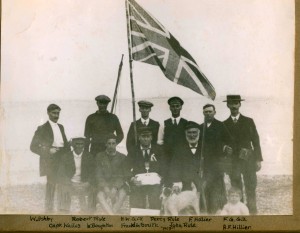
Franklin Sailing Club after inaugural first race Sept 1913. Franklin SC was renamed Weymouth SC in 1920
‘After the race’ the report continues ‘a dinner was held at the Star and Garter Assembly Rooms’ at the conclusion of which ‘the Chairman [Mr Franklin Smith] addressed the meeting, expressing the pleasure it gave him to be present that evening, and also to have been a competitor in what he described as one of the finest small boat races he had ever witnessed, speaking from experience on both sides of the Atlantic. He hoped that now such a good start had been made, these races would be continued, and suggested a series of weekly races to be held under the same rules. After presentation of the prizes it was unanimously agreed to form a Sailing Club, and on the proposition of Mr. F. G. Gill it was agreed that it be called ‘The Franklin Sailing Club’ after Sir John Franklin, the famous discoverer of the North-West Passage, and also as a compliment to their chairman. It was unanimously agreed that Mr. Franklin Smith should continue as Chairman [and Commodore], Mr. P. J. Rule as Secretary, and Mr. H. W Gill as Treasurer.
The club thus evolved has maintained its identity and tradition unchanged in all but name until the present day, and hence its inauguration at this historic meeting marks the true beginning of the Weymouth Sailing Club.
Two further races were held this year, for the first of which a cup was presented by Mr. H. Marsh and won by the Commodore who is seen holding it in the group forming the frontispiece. This group was taken immediately after the presentation on the beach, and includes all competing skippers.
One of the ambitions of the new Commodore was to fly the Blue Ensign, and hence we read in the minute book of a resolution passed at the above meeting ‘that a great effort be made to increase the membership to fifty, so as to allow an application to be made for the club to become Incorporated, thereby giving the privilege of being called The Royal Franklin Sailing Club.’
Fortunately, perhaps, for its democratic traditions, nothing came of this high-falutin’idea, though at a subsequent meeting it was resolved that the cap badges of the Commodore and Vice-Commodore should include ‘gold laurel leaves; and that the club burgee should be red with a gold maple leaf – the latter in tribute to Franklin’s Canadian origin’.
The new club differed from its predecessors in being essentially democratic, but soon after acquiring its official status it attracted a number of distinguished residents [including some ex-Corinthians] and these appear to have formed a tacit opposition to the existing regime. In the face of this, Mr. Percy Rule found his position as Hon. Secretary becoming so untenable that, at a general meeting in March 1914 he tendered his resignation. This resignation being accepted with regret, the meeting was declared to be the A.G.M. and the ensuing election of officers put the opposition into power by voting the secretaryship to Mr. A. D. Hownam-Meek replacing Mr. F. G. Gill [Asst Hon. Secretary] by Mr. J. E. Rink [now associated with his cup], and transferring the treasury from Mr. Ball to Mr. H. G. Pitcher. Mr. F. G. Gill, who wrote up the club minute book until he left the town in December, married Percy Rule’s sister and now lives at Swanage. Only the Commodore and Vice-Commodore were re-elected to office, Mr. Taylor and Mr. Hillier being retained on the Committee, which was augmented by Major Rudyeard and Messrs. Rolls, Hunt, J. E. Pearce, W. L. Bussell and T. R. Wakefield.
This clean sweep must have been a bitter blow for Mr. Percy Rule, who, though present, was not even elected on to a subcommittee; and indeed he was so grieved that a few days later he wrote a letter to the committee complaining of his treatment at their hands, and announcing his retirement from the club, and also that of his friend, Mr. Hillier, who stood by him. The Commodore and Mr. Taylor apparently talked them both round later, but Percy Rule never got over the slight, for his name now disappears from the records of the club which had been so much his own creation, and for which he worked so hard, The new committee drew up a set of 14 rules and fixed the annual subscription at five shillings.
For its first season the new club was enriched by the acquisition of our now famous trophies:- The Franklin Smith Cup, The Rink Cup, the Hambro Cup and the Huxtable Rose Bowl. The first three were allocated respectively to the A, B and C classes into which boats were divided, while the Rose Bowl was reserved ‘for the boat which, in the committee’s opinion, put up the best performance for the season.’ In order to cater for the current practice of hiring beach boats it was decreed that in such cases all prizes should go to the charterers, but that for private craft all points and prizes should go to the boat and not the man. Competition for cups was regulated by five rules, one of which required holders to sign guarantees to return cups in good condition at the next autumn general meeting.
The A and B classes [over 18ft. and 14-18ft. respectively] were handicapped by taking an average of what each skipper considered to be suitable allowances for all boats in the class except his own, with automatic adjustments in units of ten seconds added according to place after each race [2nd +10, 3rd +20 etc.], an idea borrowed from the Littlehampton Sailing Club. The C class dinghies [14ft. and under] were allowed one minute per foot of overall length [below 14ft.] over a six mile course, an old Sandown Regatta rule.
In this connection Mr. Hillier recounts that his Doris was found to exceed the 14ft. limit by one inch, but her stem was so generously proportioned that the offending inch was easily removed, to the astonishment of the official measurer!
The season began with an opening cruise on May 20th, and the first race was a special sealed handicap event with an entrance fee of 1s per head [‘bob-a-nob’] to defray expenses and provide three prizes. The remaining races, scheduled for alternate Wednesdays, were to count towards the cups and monetary prizes.
The course extended from a starting line off the Jubilee Clock round a mark off the Turnpike House [the present ‘Chemmers’], and an eastern mark forming an equilateral triangle with 2 mile sides. The O.D. [usually Mr ‘Mac’ Dermott], armed with a shot-gun, a megaphone and a stop-watch, functioned from a stake-boat on the starting line, and indicated course-direction by means of a blackball hoisted on the mast above the flag for marks to port, below for marks to starboard. Boats wore racing flags, but the use of recall numbers was optional. The class flags were: A red, B white and C blue. Racing was conducted under three ‘Sailing Rules’, viz. Y.R.A. plus two local rules on course and starting.
One or more competitors seem to have caused a frown by parking unwanted ballast in the stake-boat for at a committee meeting on July 22nd a resolution is recorded that ‘judges shall not take ballast out of racing boats in future.’
Little did the framers of that resolution think that their ‘future’ would be limited to only one more race before the breaking of a world-wide storm was to end their sailing for five disruptive years. The consequences of the declaration of War against Germany [August 4th 1914] were faced at a committee meeting on August 15th when it was decided that ‘under the present war conditions there shall be no more racing this season,’ with a gleam of hope [or wishful thinking] in a final clause; ‘should conditions materially alter for the better, a further meeting shall be called.’
By the end of October, no ‘material improvement’ being evident, it was decided to award the cups to the winners for the curtailed season, ‘on the understanding that none were to be considered as won outright.’
So a little presentation ceremony was held on October 31st, when the Hambro [best performance] and Franklin Smith cups went to Mr. Hillier’s Doris, the Huxtable Rose Bowl to the club’s only lady member, the intrepid Mrs. Mackenzie Grieve, and the Rink Cup to Mr. Hownam Meek’s Saracen, to be held in safe custody by the Hon. Treasurer for Mr. Hownarn Meek, absent on active service.
In Mr. Hownam Meek’s absence the secretarial duties were taken over pro tem by Mr. T. R. [‘Pussy’] Wakefield, another honoured father of our present club, whose bearded visage and drawling voice were familiar in club circles until the beginning of the Second World War. In his work Mr. Wakefield had the staunch support of Mr. Pitcher, and, reading between the sparse lines of the minute book for the next five years, it is evident that these two stalwarts were entirely responsible for keeping the club alive during the ’14-18 War’. It is therefore fitting that we should realize and here express the debt of gratitude we owe to these our benefactors for the privileges we now so richly enjoy.
Evidence of the club’s continued activity is manifest in its effort, in the second summer of the War, to organize a programme of aquatic sports for the garrison at Portland, concerning which Mr. Wakefield wrote to the Southern Times in June 1915. ‘As it is impossible for the Franklin Sailing Club to hold their series of races this year owing to the War it has been decided to hold a series of aquatic sports for the benefit of the Troops of the Garrison. To that end the sanction of the G.O.C. and of the Commodore, Portland, has been obtained, and a strong working committee appointed. To provide prizes generous subscriptions have been given by the local Banks and tradesmen, and it is hoped that members will pay their subscriptions as usual, so that a successful series of sports can be looked forward to.’
Unfortunately nothing came of this laudable project, ‘mainly’ as Mr. Wakefield explained at a later date, ‘because most people concerned were working at high pressure.’
Mr. Pitcher’s balance sheet for the club’s first season [submitted at the A.G.M. on May 17th 1915] was copied into the minute book by the conscientious temporary Hon. Sec. and contains some interesting information. For instance, subscriptions brought in £14 10s. [45 members, plus donations] and race entry fees brought in a further £4 6s. for the five races sailed. Expenditure included items for ‘rafts, flags and signals’ valued at £2 6s. 2d. [cost price]; engraving cups 7s-4d, printing exhibition cards for cups 1s-6d., and insurance of cups [for £25] 5s. The balance at the bank was £7.
At this meeting ‘it was decided to ask Mr.J.Pearce to erase the name of the Franklin Sailing Club from the board advertising his boats on the beach.’
The next, and only other record of the War period is of the A.G.M. of 1916, on March 27th, ‘one of the stormiest nights of the past winter,’ which perhaps partly accounted for a poor attendance. The business was chiefly concerned with the recovery of cups, with particular reference to Mr. Hillier, who, in a Flanders dug-out, had other things to do!
The Armistice of November 11th 1918 was ratified by the Peace Treaty in May 1919, and at last the War was over. Thereupon Messrs. Wakefield and Pitcher set about the task of getting the club on its feet again and called a general meeting on June 10th. Only three other people turned up, however, so a second attempt was made on July 8th. This time nine people were present, many evidently still being occupied with the aftermath of War, including the Commodore, Vice-Commodore [now Major Lithgow, who resigned], official Hon.Secretary [Paymaster Lieut. A. D. Hownam Meek], and Mr. Rink. In view of this reduced membership. it was decided to run a programme of a few special races for small monetary prizes, and not to compete for the cups in the forthcoming season.
We read also that the question was raised of changing the name of the club, so that ‘Weymouth’ might be included in the title; but, though several were in favour of this ‘it was decided to carry on the club under its old name at present.’ Franklin was re-elected Commodore and the new Vice-Commodore was Mr R. N. Byles.
At the close of this meeting a list was recorded of members who had assisted their country during the late war and for historical purposes it is appropriate to quote it:- ‘Mr. Turner, killed in action; Mr. Kellaway lost in Leinster; Mr. Franklin Smith, work in munitions [torpedoes]; Mr. Hownam Meek, Paymaster R.N; Mr. Powell, recruiting; Major Pearce, Major Bloxham, Lieut. Rule, Messrs. Taylor, Hillier, Pitcher, Hedges, Bull, Rink and Dermott – various branches of H.M. Services; Messrs. Wakefield and George, Weymouth Volunteers.’
At a committee meeting on July 15th it was decided ‘not to take any action, as a club, in Peace Day celebrations, owing to lack of time.’
The first post-war season started with a handicap race on July 30th, open to all amateurs, with an entrance fee of 2s-6d. This was the first club race for five years and was entered by ten contestants, of which the limit boat was Bumble Bee with an allowance of 31 minutes. The race was won by Mr. Pitcher’s Dolphin in a very light breeze, which caused four boats to give up, but on the strength of the support received it was decided to run a series of three further races at fortnightly intervals, two with marks to starboard, and one with marks to port [regardless of wind direction!] The handicaps for these races were to be adjusted in units of thirty seconds ‘each boat receiving an additional half-minute from the boat finishing ahead of her’; and the Hon. Sec. [pro tem] was instructed ‘in making out the newspaper reports, to give the names of owners as well as of the boats’ – a point he had omitted in his previous report to the Weymouth Telegram.
The first race got rather badly disorganised by the weather, and had to be postponed twice – first on account of ‘wet and storm’ [August 20th] and then on account of ‘continuous rain and no wind’ [September 3rd], and when it was finally sailed on September 10th it became enveloped in a thick fog, ‘which caused the whole affair to be unsatisfactory, as it was impossible at times to find the mark buoys, and several boats went out of their courses.’ Results of this race, decided on the first round, gave another first to Mr. Pitcher’s Dolphin, with Mr. Thompson’s Cicero second, and Mr. Hillier’s new acquisition Albatross third.
This foggy race gave rise to an emergency committee meeting, ‘held on Mr. Bussell’s premises on the quay’ [the sallloft], at which it was decided that ‘owing to fog the race was no test of boat-sailing and … should not count as a club race.’ Mr. Hillier objected to this decision, but was overruled. [He had manfully come in first after two circuits]. Three further dates were fixed, and ‘it was felt that it would be more convenient if a mark buoy be placed 100 yards in a northerly direction to form an imaginary line from the pier.’ These three remaining races were more successful, the first two being won by Redwing [Mr. Byles snr.], and the third by Dolphin in a strong westerly blow, with Jose [Mr. Miles] second, and Col. Williams’ Colleen third.
The Annual General Meeting of October 1919 was again poorly attended, only eleven members being present. On the question of the return of trophies, Mr. Hillier said he would be happy to return the Hambro Cup, and eventually agreed to return the Commodore’s Cup also. Regarding the Huxtable Cup, Mr. Wakefield was instructed to write again to Mrs. Mackenzie Grieve requesting its return, and in this the lady also duly complied, attributing the delay to a recent severe illness.
The question of ownership of cups was finally clarified at a committee meeting on March 18th, 1920, when a resolution was passed ‘that all cups, the property of the club, should never be won outright, but raced for annually as challenge cups; the cups to be held until the general meeting the following October’, a ruling observed to this day.
A new set of rules was drawn up by a special sub-committee [Mr. H. N. Byles, Mr. Pitcher, Mr. Bussell and Col. Williams] during the winter; and arrangements were made for the hire of a room at the Crown Hotel as the club’s headquarters. A number of new members were elected and the club stood firmly on its feet once more, to greet a rosier future.
There had been no election of officers at the previous A.G.M, but it was evident that Mr. Franklin Smith would have to be replaced as Commodore owing to his continued absence [he was now in Scotland running a paper-tube factory], and therefore the name ‘Franklin Sailing Club’ would be of historic value only. This lent force to the movement in favour of incorporating the word ‘Weymouth’ in the name, and at the A.G.M. of 24th April 1920 this change was quietly effected with universal approval, the name being changed to ‘The Weymouth Sailing Club.’
Col. Williams, who [as usual] took the chair, was elected the new Commodore, and ‘gave a short account of the history of the club, specially mentioning the desirability of "Weymouth" being associated with the club’s name.’ Mr. Hownam Meek was elected Vice-Commodore, Mr. Pitcher was returned as Hon. Treasurer; and Mr. Wakefield was officially installed as Hon. Secretary. A revised set of 14 rules was adopted and the annual
subscription for sailing members was raised to one guinea, that for non-sailing members being 10s-6d.
A Sailing Committee was appointed to draw up a programme with a recommendation for six races, and a cup for each of the three classes [A. B and C as before]. The new Commodore offered six silver spoons, one for the winner of each race in B class; and the opening cruise was fixed for Whit Monday, May 24th, ‘weather permitting’. Mr. Bussell undertook to provide a new set of mark buoys, and Capt. Cooke, the Harbour-master, offered a special flag ‘to be flown on the pier flagstaff in the event of a race being postponed.’ The new red and yellow club burgee was designed by Mr. Byles.
The re-named club embarked on its first full-fledged season with 20 boats on its register. Points for series races were awarded on the system of one for a first, two for a second, and so on; so that the winner of a series was the one with the lowest score for its best races [four out of six to count].
The time-honoured opening cruise [instituted by the Corinthians in 1902] was duly [and perhaps dutifully] observed on Whit Monday afternoon, by six boats only, practically all of which belonged to club officers. They were: Colleen, Reliance, Dolphin, Redwing, Jose and Bunty II; and Mr.Wakefield records that they ‘met at the pier in a gentle easterly breeze, and followed the Commodore [Colleen] to Greenhill, when the break-off was signalled.’
The first race had to be postponed on account of a strong S.E. wind, and was re-sailed a week later in such light airs that [in B class] only six out of eleven boats managed to struggle once round the course. Albatross, the only C boat out, also got round, but was disqualified for starting before the gun. After this race she was placed in class B [at scratch].
On the subject of the second race the record is unusually laconic for reasons which appear later. It seems that on this occasion the B class race was won by Mr. Wakefield in Reliance, but that his victory was turned to ashes, either by tactless comment or his own thin skin, or a bit of both. In any case his pride was so wounded that he went home and wrote an unhappy letter to the Commodore, which is preserved in the minute book. It runs:- ‘Dear Commodore, I feel that, as you have made yourself the recipient of the anonymous complaints of those who are not sportsmen enough to accept the opinions of their own handicapping committee, without referring them to your secretary, you have placed me in an impossible position, from which I can only extricate myself by resignation, which course I now take with considerable regret. I have not written up the minutes of last night’s proceedings, as I have no desire that any show of bias or feeling on either side should be recorded. Naturally, as I have not the unanimous good wishes of my fellow-members with regard to my only success in boat racing, I renounce any prize that might otherwise have come my way.’
The trouble was evidently made up amicably, for at the next Committee meeting Mr. Byles records that ‘it was resolved that the Secretary’s letter be not read, as it had been caused by certain remarks as to handicaps which appeared to reflect upon Mr. Wakefield as winner of the last race. Mr. Wakefield now accepted the Commodore’s assurances that nothing personal was, or indeed could have been, intended, as Bunty was similarly favoured by the circumstances of the day; and on the motion of Mr. Bussell a resolution was unanimously passed thanking the Secretary for his past services, and requesting him to withdraw his resignation. This Mr. Wakefield had consented to do, but asked the Assistant Secretary [Mr. Byles] to carry on for a while, as his own movements were uncertain.’
Thus we see the dangers of unguarded criticism, and learn a lesson in the need for sporting acceptance of official decisions. Mr. Wakefield, though pacified, does not take up his secretarial pen until September, and the records in the meantime are entered by Mr. Byles, supplemented by several informative press cuttings.
At this time the Town Clerk approached the club with an invitation to co-operate in an endeavour to ‘revive the Town Regatta’; and the Royal Dorset Yacht Club offered a prize of £10 for a club race to be sailed over the R.D.Y.C. Regatta course. Both invitations were readily accepted.
The weather on the day appointed for the third club race turned so rough that the event was called off, and the mark buoys had to be ‘abandoned at sea’ only one being subsequently recovered. New mark buoys to an improved design were made by Mr. Hutchings, and Mr. Matthews [of the Cove Inn] thereafter took them out in his motor boat ‘in return for an occasional can of petrol.’
The third race was finally sailed a week later in much better weather; as the Weymouth Telegram’s report [erroneously headed ‘Franklin Sailing Club’] describes: ‘The third race of the Weymouth Sailing Club’s season …. took place on Wednesday under very pleasant conditions – bright sunshine, smooth sea and south-westerly breeze. The club course thus provided a run to the outer mark, a reach towards Preston beach, and a beat to windward back to the pierhead, twice round. It was emphatically a day for the small light-weather boats, and in class A Major Foster’s redwing Margot made a good fight with the much larger Saracen [Mr.A. D. Hownam Meek]; while in class B Mrs. MacKenzie-Grieve’s Kelpie, sailing for the first time since 1914, came in second out of eleven starters less than five minutes behind Mr. Pitcher’s Dolphin, who easily saved her time allowance and won the silver spoon given for each race by the Commodore [Lieut. Col. A. B. Williams].
With a good start, the B class were a pretty sight running together to the first mark, but on the next leg Dolphin gradually drew ahead and Kelpie caught and passed Hirondelle for second place. After the second mark the boats scattered all over the bay, according to widely differing opinions of their skippers as to the best way to tack. There was no race in C class, Mr. Tumer’s Kismet being the only starter. Mr. Wakefield’s Reliance did not finish.
The R.D.Y.C. Regatta is reported in three cuttings, two of which [in the Southern Times] are worthy of note:-‘The Royal Dorset Yacht Club Regatta gave that touch of distinction to the season which it has lacked for some years past, and the racing provided a fascinating spectacle to the crowds of people on the various coigns of vantage. The new stone pier was the favourite rendez-vous, and here the course of the yachts could be followed as easily as if one was at sea. It is a fine addition to the town’s assets and very popular with visitors who want to get the maximum of health-giving ozone. Naturally all eyes were turned on the old Britannia and her attendant destroyer. Her race from Cowes to Weymouth provided her with one of the smartest victories of the season, and His Majesty was very pleased at his yacht’s success. She has taken part in twenty three races, winning seven first prizes. There was some capital racing for the prizes offered to the Weymouth Sailing Club, but the town sadly missed the shore sports which used to be such a popular supplement to the Regatta. The war is over now, and it is time that the various clubs got back to the normal. The present stagnation is not creditable to a seaside resort.’
We are glad that the Sailing Club at least was exempt from the taunt of ‘stagnation’! Its exploits on this occasion are recorded in the second cutting:-‘The local sailing club is going very strong, and a turnout of fifteen small craft in the Bay was a sight for those who have been moaning and deploring the little interest which Weymouth people take in any form of sport. Perhaps next season the officials will see to it that, following the Yacht Club’s days, the town has a Regatta of its own, and a Regatta worthy of the name.’
So the Town Regatta evidently did not materialize this year.
The Club’s race had a sequel in a protest lodged by the Commodore [Colleen], against the victory of Jose [J. Miles] on the ground that ‘since the declaration of the handicaps she altered her sail area by bending a larger mainsail.’
After discussion, however, the protest [which ‘was made as a matter of principle with no wish to penalise the Jose‘] was dismissed on the ground that it was not made to the officer of the day at the close of the race. But, with a view to dealing with such cases in future, it was resolved ‘that any alteration in rig or sail area must be notified to the secretary in writing at least seven days before the race will take effect.’
The sixth and last race of the series was sailed, the report tells us, ‘in continuous rain,’ but seven boats turned out to decide the issue of the Hambro Cup, and three ‘for the love of sport’ in C class. B class had a good race, the first four finishing within two minutes. Dolphin, first as usual, was thus unable to shake off her handicap, but easily secured the Hambro Challenge Cup [given by Capt. Angus Hambro, M.P.] for the season, with two firsts, a second and a fourth in her four best races.’ In C class Kismet [E.S.Turner] easily won the Huxtable Rose Bowl, and Saracen took the Rink Cup after two extra duels with Margot to decide the issue.
The last scheduled race on the programme was the all-in-race for the Franklin Smith Cup [equivalent to our present Phillipson Cup Race], and here again we are indebted to the Weymouth Telegram [and Mr.Wakefield]: ‘The Weymouth Sailing Club completed their programme for the season with a combined race for the Challenge Cup presented by Mr. Franklin E. Smith, all boats except winners of class cups being eligible. Conditions were pleasant, the race being sailed in sunshine. It was no easy task to bring together twenty boats of such varied sizes and rigs, but as a whole the handicap proved very close, with only sixteen minutes between the ten boats after the first, St. Barbara, refitted and sailing better than ever before, won easily, equalizing Sprig‘s sailing time, with a very close struggle between the latter and Jose for second place. [Eleven boats are listed]. Ariel, Reliance and Tom Tit did not complete the course. The scratch boat, Yvette, entered by permission of the sailing committee, for trial purposes only, not being eligible for the cup.’
Yvettewas Mr. Bussell’s new cutter, which appeared on the scene at the end of August.
It seemed a pity to pack up such a successful season so soon, and this thought evidently occurred to Mrs. MacKenzie-Grieve, for, on September 8th the committee assembled to hear a letter from this lady ‘offering to present a silver cup, to be won outright, by the best two results in three races – all boats except challenge cup winners to be eligible to compete.’ This offer was gladly accepted, dates were fixed and it was agreed to give handicap times at the beginning [ˆ la Phillipson] instead of deducting them at the end, an innovation calculated to provide ‘a much keener sense of individual rivalry and proportionately greater interest’ [to spectators], since ‘a boat once overtaken has again to overtake the leader in order to win.’ [Thus wrote Mr. Wakefield in the Telegram – ‘New Rules for a New Cup.’]
These three races were duly sailed off, the first two in light winds and the final one in very squally weather [September 18th] which caused several mishaps. Thus Margot we read ‘was prevented from sailing, Kelpie was unable to complete the course, Redwing and Reliance had minor mishaps, and after one round the race was called off. On arrival at the pier, to where Kelpie was towed by Yvette, hearty cheers were given by the assembled boats for the donor of the cup, whose sporting spirit is much appreciated by members of the club. The cup goes to Jose with three points, followed by Kelpie with four – this concludes the season’s racing, which has been very successful and very enjoyable.’
The Prizegiving took place at a dinner at the Crown Hotel, which was attended by about thirty members and friends, all men, with the exception of Mrs. MacKenzie-Grieve, who, escorted by her husband [a Commander R.N.] arrived to present the prizes. The occasion is well described in the words of Mr. Wakefield’s press report:-‘The first full racing season in the Club’s history was brought to a fitting conclusion by the General Meeting, presentation of prizes and dinner at the Club’s headquarters, the Crown Hotel. [Here follows a list of prlzes already outlined]. On the proposition of Mr.Miles, hearty cheers were given for Mrs. MacKenzie-Grieve, whose pluck and sporting spirit in sailing her boat in all weathers were the admiration of the whole club.’
Col. Williams, who had tendered his resignation as Commodore, through ‘dissatisfaction on several matters’ was not present, and in his absence Mr. Hownam Meek [Vice-Commodore] ‘proved himself to be as much a master of the art of addressing a meeting as he is of sailing a boat, which is saying a lot.’